Military Leaders
Brigadier General Ismail Ghaani is a Specially Designated National by the U.S. Department of the Treasury and the head of the Islamic Revolutionary Guard Corps’ elite Quds Force (IRGC-QF), a U.S.-designated Foreign Terrorist Organization responsible for Iran’s proxy conflicts in the Middle East.“Anti-Terrorism Designations,” U.S. Department of the Treasury, March 27, 2012, https://www.treasury.gov/resource-center/sanctions/OFAC-Enforcement/Pages/20120327.aspx; Zachary Cohen, Hamdi Alkhshali, Arwa Damon and Kareem Khadder, “US drone strike ordered by Trump kills top Iranian commander in Baghdad,” CNN, January 3, 2020, https://www.cnn.com/2020/01/02/middleeast/baghdad-airport-rockets/index.html. The IRGC-QF has played an active role in providing training and weapons to extremist groups including Iraqi insurgents, Lebanese Hezbollah, and others.Dexter Filkins, “The Shadow Comander,” New Yorker, September 23, 2013, https://www.newyorker.com/magazine/2013/09/30/the-shadow-commander. Following the death of former IRGC leader, Qasem Soleimani—who was killed in a U.S. airstrike near Baghdad International Airport on January 3, 2020—Iran’s Supreme Leader, Ayatollah Ali Khamenei, quickly appointed Ghaani as Soleimani’s replacement.Tara John, Julia Hollingsworth and Rob Picheta, “Iran's top general Soleimani killed in US drone strike,” CNN, January 3, 2020, https://www.cnn.com/middleeast/live-news/baghdad-airport-strike-live-intl-hnk/index.html. By the end of 2021, however, reports emerged that Ghaani had lost control over the Iran-backed Iraqi militias, which were openly defying his orders.Suadad al-Salhy, “Betrayed by Iran? Iraqi armed factions given ‘slap’ with Kadhimi drone attack,” Middle East Eye, November 29, 2021, https://www.middleeasteye.net/news/iraq-iran-kadhimi-drone-attack-armed-groups-betrayed; Jared Malsin, Ghassan Adnan, and Benoit Faucon, “Iraq Struggles to Control Iran-Allied Militias Believed Responsible for Attack on Prime Minister,” Wall Street Journal, November 9, 2021, https://www.wsj.com/articles/iraq-struggles-to-control-iran-allied-militias-believed-responsible-for-attack-on-prime-minister-11636475084.
Upon Ghaani’s appointment, Khamenei described him as “one of the most distinguished Revolutionary Guard commanders.”“Khamenei Appoints Hardliner General to Replace Soleimani,” Radio Farda, January 3, 2020, https://en.radiofarda.com/a/khamenei-appoints-hardliner-general-to-replace-soleimani/30358646.html. Ghaani fought in the 1980-1988 Iran-Iraq war, leading the Nasr-5 and Imam Reza-21 brigades.Zehra Nur Duz, “Iran’s supreme leader names new commander of Quds Force,” Anadolu Agency, January 3, 2020, https://www.aa.com.tr/en/middle-east/iran-s-supreme-leader-names-new-commander-of-quds-force/1691311. A close aide and confidante to Soleimani, Ghaani served as an intelligence official in the IRGC-QF and was the deputy commander of the unit for more than 20 years.“Khamenei Appoints Hardliner General to Replace Soleimani,” Radio Farda, January 3, 2020, https://en.radiofarda.com/a/khamenei-appoints-hardliner-general-to-replace-soleimani/30358646.html.
On March 27, 2012, the U.S. Department of the Treasury listed Ghaani as a Specially Designated National for his role in overseeing financial disbursements and weapons shipments to Hezbollah and IRGC-QF elements in both the Middle East and Africa, particularly the Gambia.“Treasury Targets Iranian Arms Shipments,” U.S. Department of the Treasury, March 27, 2012, https://www.treasury.gov/press-center/press-releases/Pages/tg1506.aspx.
As Soleimani’s successor, Ghaani wields political influence in Iraq, where Iranian-sponsored militias participate in the government. Ghaani reportedly made trips to Iraq to meet with government officials prior to the nomination of Prime Minister Mustafa al-Kadhimi in April 2020, though he claimed Iran would not interfere in Iraqi domestic affairs.“Iran welcomes Iraq’s new prime minister,” Al-Monitor, April 13, 2020, https://www.al-monitor.com/pulse/originals/2020/04/iran-welcome-iraq-prime-minister-kadhimi.html. In December 2020, Iranian Ambassador to Iraq Iraj Masjedi told Iranian media that all Iraqi factions, political parties, and resistance groups have positive relations with Iran, which does not interfere in the internal affairs of the Iraqis. Masjedi’s comments came shortly after Ghaani held meetings in Iraq with Khadimi, Iraqi President Barham Salih, and other officials.“All Iraqi political factions hold positive ties with Iran,” Mehr News Agency, December 5, 2020, https://en.mehrnews.com/news/166768/All-Iraqi-political-factions-hold-positive-ties-with-Iran.
Ghaani is also an influential Iranian figure in Syria, where he is considered one of the key figures in Iran’s involvement in Syria’s civil war.“Khamenei Appoints Hardliner General to Replace Soleimani,” Radio Farda, January 3, 2020, https://en.radiofarda.com/a/khamenei-appoints-hardliner-general-to-replace-soleimani/30358646.html. Ghaani’s first international trip after his promotion was to Aleppo, Syria, in March 2020. Syrian National Reconciliation Committee member Omar Rahmon told Iranian media that Ghaani’s visit signaled Iran’s continued support for the Syrian regime.“Commander Ghaani’s visit to Aleppo sends significant message: Syrian politician,” Mehr News Agency, March 10, 2020, https://en.mehrnews.com/news/156591/Commander-Ghaani-s-visit-to-Aleppo-sends-significant-message.
U.S. officials have suggested that Ghaani could be assassinated like his predecessor.“‘General Soleimani was truly a general of peace and security,’” Tehran Times, February 9, 2020, https://www.tehrantimes.com/news/445002/General-Soleimani-was-truly-a-general-of-peace-and-security. Ghaani is known for his criticism of the United States and Israel, promising “very difficult days” ahead for both countries.“IRGC Quds Force chief: Warship incident is a response to U.S. crimes conducted by American elements,” Tehran Times, July 14, 2020, https://www.tehrantimes.com/news/450037/IRGC-Quds-Force-chief-Warship-incident-is-a-response-to-U-S. He has accused the U.S. military of being tired and worn out and declared the United States should expect punishment from God for its crimes.“Hard days waiting for US, Zionist Regime: Ghaani,” Mehr News Agency, July 14, 2020, https://en.mehrnews.com/news/160975/Hard-days-waiting-for-US-Zionist-Regime-Ghaani. Weeks after his appointment to the Quds Force leadership, Ghaani held phone calls with Hamas leader Ismail Haniyeh and Palestinian Islamic Jihad (PIJ) leader Ziad al-Nakhalah. Referring to U.S. President Donald Trump’s Middle East peace plan, Ghaani told Haniyeh Iran is ready to confront and foil the United States’ plot in the region with the cooperation of the Palestinian people.“Ghaani, Haniyeh discuss US new plot for Palestine,” Mehr News Agency, February 2, 2020, https://en.mehrnews.com/news/155179/Ghaani-Haniyeh-discuss-US-new-plot-for-Palestine. After the death of former PIJ leader Ramadan Shallah in June 2020, Ghaani pledged Iran would continue to follow in Soleimani’s path by standing by “the Palestinian resistance and all resistance combatants” and continuing to strengthen “the Axis of Resistance.”“Ghaani vows to stand by Palestinian resistance movement like martyr Soleimani,” Mehr News Agency, June 20, 2020, https://en.mehrnews.com/news/159991/Ghaani-vows-to-stand-by-Palestinian-resistance-movement-like. According to Nakhalah, Ghaani “has a great role in supporting the resistance, especially in the present time.”“Al-Nakhalah deplores Zionists' plan for West Bank annexation,” Mehr News Agency, May 19, 2020, https://en.mehrnews.com/news/158881/Al-Nakhalah-deplores-Zionists-plan-for-West-Bank-annexation.
Ghaani’s role has been to convince Iraqi militias that it is not in their best interest to fire rockets in locations that maintain U.S. forces—particularly in the Green Zone which was hit with a rocket on January 26, 2020 and the Erbil airport in northern Iraq on February 16, 2021.Martin Chulov, “Iraqi militias grow in power as Iran’s military strongman proves too weak,” Guardian, July 26, 2021, https://www.theguardian.com/world/2021/jul/26/suleimani-successor-fails-to-convince-at-summit; “Rocket attack on Iraqi airbase where US defense company operates,” Guardian, February 20, 2021, https://www.theguardian.com/world/2021/feb/20/rocket-attack-iraqi-airbase-us-defense-company; “US embassy in Iraq hit by rocket attack, wounding at least one,” Guardian, January 26, 2020, https://www.theguardian.com/world/2020/jan/27/us-embassy-iraq-rocket-attack-injuries; Bethan McKernan and Julian Borger, “Rocket attack on US airbase in Iraq kills civilian contractor,” Guardian, February 16, 2021, https://www.theguardian.com/world/2021/feb/16/rocket-attack-us-airbase-iraq-kills-civilian-contractor. However, following the inauguration of the Biden administration in January 2021, the militias have continued and even intensified displays of violence, demonstrating Ghaani’s inability to adequately control the Iranian-aligned Iraqi militia groups to the same capacity as his predecessor. Furthermore, according to media sources, Ghaani allegedly does not have the same expertise as his predecessor and does not have a rapport with Khamenei or his office—a critical element of his role as commander of the Quds Force.Martin Chulov, “Iraqi militias grow in power as Iran’s military strongman proves too weak,” Guardian, July 26, 2021, https://www.theguardian.com/world/2021/jul/26/suleimani-successor-fails-to-convince-at-summit.
These allegations were exacerbated following a November 7, 2021, drone attack on the Baghdad home of Prime Minister Mustafa al-Kadhimi. Suspicions fell on Iran-backed militias, particularly Asaib Ahl al-Haq (AAH) and Kata’ib Hezbollah (KH). The militias and Iran denied involvement in the attack, which lightly wounded Kadhimi and wounded seven members of his security detail. Ghaani visited Baghdad on November 8 and denied Tehran had any connection to the attack.Hamdi Alkhshali, “Iraqi Prime Minister survives exploding drone assassination attempt,” CNN, last updated November 8, 2021, https://www.cnn.com/2021/11/06/middleeast/iraq-prime-minister-drone-attack-intl-hnk/index.html; “Iran-backed militia behind attack on Iraqi PM -security officials, sources,” Reuters, last updated November 8, 2021, https://www.reuters.com/world/middle-east/iran-backed-militia-behind-attack-iraqi-pm-sources-2021-11-08/; Qassim Abdul-Zahra, “Powerful Iranian general visited Iraq after attack on PM,” Associated Press, November 8, 2021, https://apnews.com/article/middle-east-religion-iran-iraq-tehran-8cfe754e681581f511f430f4bd31e776. Following the attack, reports emerged of fractures between Iran and its proxies. AAH and KH have reportedly openly defied orders from Ghaani. AAH commander Qais al-Khazali and KH commander Abu Hussein al-Hamidawi allegedly told the Iranians that Tehran’s support for Kadhimi receiving a second term in Iraq’s October 2021 elections broke the allies’ bond. Some security analysts in Iraq allege Ghaani has lost control over the Iraqi militias.Suadad al-Salhy, “Betrayed by Iran? Iraqi armed factions given ‘slap’ with Kadhimi drone attack,” Middle East Eye, November 29, 2021, https://www.middleeasteye.net/news/iraq-iran-kadhimi-drone-attack-armed-groups-betrayed; Jared Malsin, Ghassan Adnan, and Benoit Faucon, “Iraq Struggles to Control Iran-Allied Militias Believed Responsible for Attack on Prime Minister,” Wall Street Journal, November 9, 2021, https://www.wsj.com/articles/iraq-struggles-to-control-iran-allied-militias-believed-responsible-for-attack-on-prime-minister-11636475084. In February 2022, U.S. General Frank McKenzie, head of U.S. Central Command, told the Middle East Institute Ghaani “does not exercise the same degree of control over Iranian-aligned militia groups” as Soleimani did. The declaration followed months of growing speculation Ghaani is losing control over Iran-backed militias in Iraq.Joyce Karam, “Iran’s Quds force commander struggling to control proxy militias, top US general says,” National (Abu Dhabi), February 3, 2022, https://www.thenationalnews.com/world/us-news/2022/02/03/irans-quds-force-commander-struggling-to-control-proxy-militias-top-us-general-says/. After a January 28, 2024, drone attack killed three U.S. servicemembers in Jordan, Ghaani met with Iraqi militia leaders in Baghdad on January 29 to implore them not to target U.S. forces, warning that attacking Americans risked escalation and further U.S. intervention in Iraq. Ghaani instructed the groups to maintain low profiles to avoid U.S. retaliation against their leaders. The following day, KH announced its suspension of attacks. All but one of the factions agreed to Ghaani’s appeal. According to one senior commander cited by Reuters, Ghaani’s intervention was integral to convincing KH to halt its attacks.Ahmed Rasheed, Parisa Hafezi, and Timour Azhari, “Iraqi armed groups dial down U.S. attacks on request of Iran commander,” Reuters, February 18, 2024, https://www.reuters.com/world/middle-east/iraqi-armed-groups-dial-down-us-attacks-request-iran-commander-2024-02-18/.
On September 14, 2023, French prosecutors filed a criminal complaint against Ghaani, IRGC commander-in-chief Hossein Salami, and Iranian Intelligence Minister Esmail Khatib. According to the complaint brought by six Iranian and Franco-Iranian plaintiffs, between December 2022 and January 2023 the three defendants issued death threats and justified terrorism against people supporting Iranian protests over the death of Mahsa Amini. Amini died in Iranian custody on September 16, 2022, for violating Iran’s female dress code.Agence France-Presse, “Iran Revolutionary Guards chief targeted in French criminal complaint,” France 24, September 14, 2023, https://www.france24.com/en/live-news/20230914-iran-revolutionary-guards-chief-targeted-in-french-criminal-complaint.
On April 1, 2024, a suspected Israeli airstrike targeted an Iranian consulate building in Damascus, Syria, killing seven IRGC commanders. Khamenei pledged on April 10 that Israel would be “punished.”“Iran says Israel bombs its embassy in Syria, kills commanders,” Reuters, April 2, 2024, https://www.reuters.com/world/middle-east/israel-bombs-iran-embassy-syria-iranian-commanders-among-dead-2024-04-01/; Khamenei says Israel ‘must be punished’ for Syria embassy attack,” Reuters, April 10, 2024, https://www.reuters.com/world/middle-east/irans-khamenei-says-israel-must-be-punished-syria-embassy-attack-2024-04-10/. On April 13, 2024, Iran launched its first-ever direct attack on Israel, sending more than 300 drones and rockets toward the Jewish state. Israeli, U.S., and U.K. forces, along with regional allies, shot down 99 percent of the projectiles. The projectiles that did strike Israel caused minor damage to a military base and wounded a child in southern Israel. Iran labeled the attack a success.Faris Tanyos, Cara Tabachnick, and Tucker Reals, “Israel says Iran’s missile and drone attack largely thwarted, with ‘very little damage’ caused,” CBS News, April 14, 2024, https://www.cbsnews.com/news/iran-launches-drone-attack-toward-israel-idf-says/; Benoit Faucon, “Iranian President Hails Attack as ‘Lesson’ for Israel,” Wall Street Journal, April 15, 2024, https://www.wsj.com/livecoverage/israel-iran-strikes-live-coverage/card/iranian-president-hails-attack-as-lesson-for-israel-BVxr8zGc765oyK1yFQnW. A month later, on May 15, Ghaani warned that France, Germany, and the United Kingdom would be “held to account” for their role in defending Israel against the attack.“IRGC Quds Force commander warns France, Germany, UK,” Mehr News Agency, May 15, 2024, https://en.mehrnews.com/news/215204/IRGC-Quds-Force-commander-warns-France-Germany-UK; “IRGC General Warns UK, France, Germany, and Regional Leaders,” Iran International, May 16, 2024, https://www.iranintl.com/en/202405163718. Though most of the projectiles were shot down, Ghaani claimed the attack was a victory for Iran. He claimed that the victory was not about the missiles and drones that reach Israel but that “many secrets are hidden within this operation, which will take a long time to unravel.”“IRGC General Warns UK, France, Germany, and Regional Leaders,” Iran International, May 16, 2024, https://www.iranintl.com/en/202405163718.
- Major General Esmail Qaani“Khamenei Appoints Hardliner General To Replace Soleimani,” Radio Farda, January 3, 2020, https://en.radiofarda.com/a/khamenei-appoints-hardliner-general-to-replace-soleimani/30358646.html.
- Major General Esmail GhaaniSune Engel Rasmussen, “Iran Appoints Commander to Succeed General Killed in Air Strike,” Wall Street Journal, January 3, 2020, https://www.wsj.com/articles/iran-appoints-commander-to-succeed-general-killed-in-air-strike-11578050590.
- Brigadier General Esmail Qaani“Khamenei Appoints Hardliner General to Replace Soleimani,” Radio Farda, January 3, 2020, https://en.radiofarda.com/a/khamenei-appoints-hardliner-general-to-replace-soleimani/30358646.html.
- Major General Ismail QaaniZachary Cohen, Hamdi Alkhshali, Arwa Damon and Kareem Khadder, “US drone strike ordered by Trump kills top Iranian commander in Baghdad,” CNN, January 3, 2020, https://www.cnn.com/2020/01/02/middleeast/baghdad-airport-rockets/index.html.
- Brigadier General Ismail Qaani“Iran Promises Retaliation After U.S. Kills General: Live Updates,” New York Times, January 3, 2020, https://www.nytimes.com/2020/01/03/world/middleeast/iranian-general-qassem-soleimani-killed.html.
- Esmaeil Ghaani Akbarnejad“Anti-Terrorism Designations,” U.S. Department of the Treasury, March 27, 2012, https://www.treasury.gov/resource-center/sanctions/OFAC-Enforcement/Pages/20120327.aspx.
- Ismail Akbar Nezhad“Anti-Terrorism Designations,” U.S. Department of the Treasury, March 27, 2012, https://www.treasury.gov/resource-center/sanctions/OFAC-Enforcement/Pages/20120327.aspx.
- Esmail Qani“Anti-Terrorism Designations,” U.S. Department of the Treasury, March 27, 2012, https://www.treasury.gov/resource-center/sanctions/OFAC-Enforcement/Pages/20120327.aspx.
- Esma’il Qa’ani“Anti-Terrorism Designations,” U.S. Department of the Treasury, March 27, 2012, https://www.treasury.gov/resource-center/sanctions/OFAC-Enforcement/Pages/20120327.aspx.
- Esmaeil Qaani“Ground for ‘Hard Revenge’ to Be Set from within US: IRGC Quds Force Commander,” Tasnim News Agency, January 7, 2022, https://www.tasnimnews.com/en/news/2022/01/07/2639872/ground-for-hard-revenge-to-be-set-from-within-us-irgc-quds-force-commander.
United States

The U.S. Department of the Treasury listed “Esmail Ghani” as a Specially Designated National on March 12, 2012.“Treasury Targets Iranian Arms Shipments,” U.S. Department of the Treasury, March 27, 2012, https://www.treasury.gov/press-center/press-releases/Pages/tg1506.aspx.
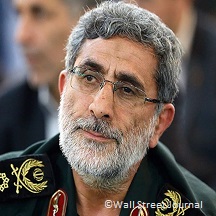
Bah ag Moussa was a U.S.-and U.N.-designated terrorist leader based in Mali. Moussa was a former officer of the Malian Armed Forces—serving as the head of the Islamic police in Timbuktu—and a founding member of Ansar al-Dine.“Security Council ISIL (Da'esh) and Al-Qaida Sanctions Committee Amends One Entry on Its Sanctions List,” United Nations, August 20, 2019, https://www.un.org/press/en/2019/sc13924.doc.htm; Andrew Lebovich, “The Local Face of Jihadism in Northern Mali,” Combating Terrorism Center at West Point, June 2013, https://ctc.usma.edu/the-local-face-of-jihadism-in-northern-mali/. In 2013, Bah ag Moussa settled in Tin Zaouatène and joined the Haut Conseil pour l’Unité de l’Azawad (HCUA)—a Tuareg political and military movement that features many members of the al-Qaeda-allied Ansar al-Din movement.“Bah Ag Moussa,” United Nations Security Council, August 14, 2019, https://www.un.org/securitycouncil/content/bah-ag-moussa. Bah ag Moussa then transmitted Iyad ag Ghali’s, Ansar al-Din’s leader, messages and recruited Tuareg fighters for the jihadist camp.“Bah Ag Moussa,” United Nations Security Council, August 14, 2019, https://www.un.org/securitycouncil/content/bah-ag-moussa.
Although he was not a public-facing member of AQIM, Bah ag Moussa—who developed a particular reputation for cruelty toward women—was far from unknown.Andrew Lebovich, “The Local Face of Jihadism in Northern Mali,” Combating Terrorism Center at West Point, June 2013, https://ctc.usma.edu/the-local-face-of-jihadism-in-northern-mali/. In 2007, after spending time in Saudi Arabia, Bah ag Moussa established a mosque in Timbuktu and began to preach on Mali’s official television station.Andrew Lebovich, “The Local Face of Jihadism in Northern Mali,” Combating Terrorism Center at West Point, June 2013, https://ctc.usma.edu/the-local-face-of-jihadism-in-northern-mali/.
In 2017, Bah ag Moussa became the operational leader of Jama’at Nusrat ul-Islam wa al-Muslimin (JNIM) under the leadership of Iyad ag Ghali. Bah ag Moussa is the half-brother of Sidi Mohamed ag Oukana, Iyad ag Ghali’s religious advisor.“Bah Ag Moussa,” United Nations Security Council, August 14, 2019, https://www.un.org/securitycouncil/content/bah-ag-moussa.
Bah ag Moussa is responsible for leading attacks in several other localities throughout northern Mali.“Treasury Targets Al-Qa’ida in Mali,” United States Department of the Treasury, July 16, 2019, https://home.treasury.gov/news/press-releases/sm730. On July 16, 2016, he led the attack against the Nampala barracks, which resulted in the death of 20 Malian soldiers.“Bah Ag Moussa,” United Nations Security Council, August 14, 2019, https://www.un.org/securitycouncil/content/bah-ag-moussa. In March 2019, Bah ag Moussa helped lead a terrorist operation against a Malian Armed Forces base in Dioura that killed at least 21 Malian soldiers.“23 Mali soldiers dead as militants attack Dioura camp in Mopti region,” Defense Post, March 18, 2019, https://thedefensepost.com/2019/03/18/mali-soldiers-killed-attack-dioura-camp-mopti/.
On July 16, 2019, the U.S. Department of the Treasury’s Office of Foreign Assets Control (OFAC), in concert with the Department of State, designated Bah ag Moussa as a Specially Designated Global Terrorist (SDGT) pursuant to Executive Order (E.O.) 13224, which targets terrorists and those providing support to terrorists or acts of terrorism.“Terrorist Designation of Ali Maychou,” U.S. Department of State, July 16, 2019, https://www.state.gov/terrorist-designation-of-ali-maychou/. On August 14, 2019, the U.N. Security Council’s ISIL (Da’esh) and al Qaeda Sanctions Committee imposed sanctions against Bah ag Moussa pursuant to paragraphs 2 and 4 of resolution 2368 (2017) as being associated with ISIL or Al-Qaida and otherwise supporting the groups’ acts or activities.“Bah Ag Moussa,” United Nations Security Council, August 14, 2019, https://www.un.org/securitycouncil/content/bah-ag-moussa.
On November 13, 2020, France announced the death of Bah ag Moussa. The operation involved helicopters and ground troops, which identified and “neutralized” Bah ag Moussa who was in a truck in the Menaka region of eastern Mali.“French forces kill jihadist commander in Mali,” France 24, November 13, 2020, https://www.france24.com/en/live-news/20201113-french-forces-kill-jihadist-commander-in-mali?utm_source=iterable&utm_medium=email&utm_campaign=1715438_; “French Forces Kill al-Qaida-Linked Commander in Mali,” Associated Press, November 13, 2020, https://www.voanews.com/africa/french-forces-kill-al-qaida-linked-commander-mali.
- Bamoussa Diarra“Counter Terrorism Designations,” United States Department of the Treasury, July 16, 2019, https://www.treasury.gov/resource-center/sanctions/OFAC-Enforcement/Pages/20190716.aspx.
- Rabia Diarra“Counter Terrorism Designations,” United States Department of the Treasury, July 16, 2019, https://www.treasury.gov/resource-center/sanctions/OFAC-Enforcement/Pages/20190716.aspx.
- Ba Ag Moussa“Counter Terrorism Designations,” United States Department of the Treasury, July 16, 2019, https://www.treasury.gov/resource-center/sanctions/OFAC-Enforcement/Pages/20190716.aspx.
- Ammi Salim“Security Council ISIL (Da'esh) and Al-Qaida Sanctions Committee Amends One Entry on Its Sanctions List,” United Nations, August 20, 2019, https://www.un.org/press/en/2019/sc13924.doc.htm.
- Mohamed ag MoussaAndrew Lebovich, “The Local Face of Jihadism in Northern Mali,” Combating Terrorism Center at West Point, June 2013, https://ctc.usma.edu/the-local-face-of-jihadism-in-northern-mali/.
United States

On July 16, 2019, the U.S. Department of the Treasury’s Office of Foreign Assets Control (OFAC), in concert with the Department of State, designates Ali Maychou as a Specially Designated Global Terrorist (SDGT) pursuant to Executive Order (E.O.) 13224, which targets terrorists and those providing support to terrorists or acts of terrorism.“Terrorist Designation of Ali Maychou,” U.S. Department of State, July 16, 2019, https://www.state.gov/terrorist-designation-of-ali-maychou/.
United Nations
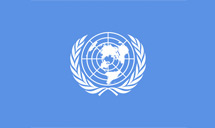
On August 14, 2019, the ISIL (Da’esh) and al Qaeda Sanctions Committee imposes sanctions against Bah Ag Moussa pursuant to paragraphs 2 and 4 of resolution 2368 (2017) as being associated with ISIL or Al-Qaida and otherwise supporting the groups’ acts or activities.“Bah Ag Moussa,” United Nations Security Council, August 14, 2019, https://www.un.org/securitycouncil/content/bah-ag-moussa.

Baha Abu al-Ata was a U.S.-designated commander of Palestinian Islamic Jihad’s (PIJ) armed wing, the Al-Quds Brigades. Abu al-Ata was a Gaza-based member of PIJ’s military council and commander of the terror group’s operations in northern Gaza.“Executive Order Amending Counter Terrorism Sanctions Authorities; Counter Terrorism Designations and Designations Updates; Iran-related Designation; Syria Designations Updates,” U.S. Department of the Treasury, September 10, 2019, https://www.treasury.gov/resource-center/sanctions/OFAC-Enforcement/Pages/20190910.aspx; Steve Hendrix and Ruth Eglash, “Israel kills a senior leader of Palestinian Islamic Jihad in Gaza airstrike,” Washington Post, November 12, 2019, https://www.washingtonpost.com/world/middle_east/israel-kills-senior-leader-of-palestinian-islamic-jihad-in-gaza-air-strike/2019/11/12/bc2817d0-0506-11ea-9118-25d6bd37dfb1_story.html. He responsible for multiple rocket attacks against Israel, according to U.S. and Israeli officials. Israel killed Abu al-Ata in a targeted airstrike in Gaza on November 12, 2019, prompting calls for war from PIJ. The terror group fired hundreds of rockets into Israel, prompting multiple Israeli airstrikes against the Gaza Strip.Adam Rasgon and Jacob Magid, “Islamic Jihad declares ‘We’re going to war,’ after IDF kills its strongman,” Times of Israel, November 12, 2019, https://www.timesofisrael.com/islamic-jihad-declares-were-going-to-war-after-idf-kills-its-strongman/; Maayan Lubell and Nidal al-Mughrabi, “Gaza death toll reaches 23 in second day of escalation,” Reuters, November 13, 2019, https://www.reuters.com/article/us-israel-palestinians-violence/gaza-death-toll-reaches-23-in-second-day-of-escalation-idUSKBN1XN0FR.
PIJ eulogized Abu al-Ata as one of the most prominent members of the Al-Quds Brigades. The Jerusalem Post labeled Abu al-Ata as “Tehran’s main man in Gaza,” noting his close ties with the Iranian leadership.Anna Ahronheim and staff, “Who is Abu al-Ata: The man behind rocket fire from Gaza Strip,” Jerusalem Post, November 3, 2019, https://www.jpost.com/Arab-Israeli-Conflict/Who-is-Abu-al-Ata-The-man-suspectedly-responsible-for-Gaza-escalation-606639. Israeli Prime Minister Benjamin Netanyahu called Abu al-Ata “the main instigator of terrorism from the Gaza Strip.”“Israel kills top Palestinian Islamic Jihad militant in Gaza,” BBC News, November 12, 2019, https://www.bbc.com/news/world-middle-east-50386164. Abu al-Ata was a politically connected longtime leader in PIJ. He previously served as deputy commander of the al-Quds Brigades in northern Gaza. In October 2019, Abu al-Ata and PIJ Secretary-General Ziad al-Nakhalah attended a meeting in Cairo with Egyptian officials that resulted in the release of 81 Palestinians from Egyptian prisons.Adam Rasgon, “Islamic Jihad official says Egypt will release 81 Palestinian detainees,” Times of Israel, October 17, 2019, https://www.timesofisrael.com/islamic-jihad-official-says-egypt-will-release-81-palestinian-detainees/; Shlomi Eldar, “IDF says it had no choice but to kill Islamic Jihad senior,” Al-Monitor, November 13, 2019, https://www.al-monitor.com/pulse/originals/2019/11/israel-gaza-strip-islamic-jihad-idf-naftali-bennett-rockets.html.
Israel held Abu al-Ata personally responsible for multiple PIJ rocket attacks throughout 2019. According to the Israel Defense Forces (IDF), Abu al-Ata “acted in every way to sabotage attempts for calm with Hamas” and “was responsible for the majority of attacks” in 2019.Anna Ahronheim, “IDF hits anti-tank missile team; Gaza dead at 23, mostly terrorists,” Jerusalem Post, November 13, 2019, https://www.jpost.com/Middle-East/Massive-barrage-towards-southern-and-central-Israel-shatters-quiet-607709. Former IDF spokesman Brigadier-General (res.) Ronen Manelis lamented that while dozens of countries were trying to improve the humanitarian situation in Gaza, “there is one man inside Gaza and one man outside the Strip trying to torpedo that,” referring to Abu al-Ata in Gaza and likely Nakhalah in Syria.Anna Ahronheim and staff, “Who is Abu al-Ata: The man behind rocket fire from Gaza Strip,” Jerusalem Post, November 3, 2019, https://www.jpost.com/Arab-Israeli-Conflict/Who-is-Abu-al-Ata-The-man-suspectedly-responsible-for-Gaza-escalation-606639.
Abu al-Ata reportedly did not seek approval from the PIJ leadership before ordering the launch of rockets into Israel, nor coordinate with the Hamas government that was actively trying to maintain a fragile ceasefire with Israel. Palestinian sources in the Gaza Strip were reportedly concerned that this defiance would lead Israel to target Abu al-Ata.“Israel kills top Palestinian Islamic Jihad militant in Gaza,” BBC News, November 12, 2019, https://www.bbc.com/news/world-middle-east-50386164. After Abu al-Ata allegedly ordered the launch of a rocket into Israel on April 29, 2019, the IDF tweeted a photo of Abu al-Ata, holding him responsible and accusing PIJ of undermining Israel’s ceasefire between with Hamas. Israeli media viewed the tweet as a warning that Abu al-Ata might be specifically targeted.Anna Ahronheim, “IDF hits anti-tank missile team; Gaza dead at 23, mostly terrorists,” Jerusalem Post, November 13, 2019, https://www.jpost.com/Middle-East/Massive-barrage-towards-southern-and-central-Israel-shatters-quiet-607709; Judah Ari Gross, “IDF accuses Islamic Jihad of Gaza rocket fire, cuts fishing zone as punishment,” Times of Israel, April 30, 2019, https://www.timesofisrael.com/idf-accuses-islamic-jihad-of-gaza-rocket-fire-cuts-fishing-zone-as-punishment/.
Abu al-Ata had previously survived multiple Israeli assassination attempts. Israel tried to assassinate him in November 2012 during Operation Pillar of Defense, an eight-day Israeli operation in response to rocket attacks from Gaza.Matthew Kalman, “Massed Israeli Troops Poised for Invasion of Gaza,” Independent (London), November 15, 2012, http://www.independent.co.uk/news/world/middle-east/massed-israeli-troops-poised-for-invasion-of-gaza-8316615.html; Jack Khoury, “Who Was Baha Abu al-Ata, Gaza's Elusive Islamic Jihad Commander Assassinated by Israel,” Haaretz (Tel Aviv), November 12, 2019, https://www.haaretz.com/israel-news/.premium-israel-gaza-jihad-islamic-war-1.8071140. On August 3, 2014, during the summer war between Israel and Hamas, Israel killed al-Quds Brigades commander Daniel Mansour, while Abu al-Ata—who was serving as Mansour’s deputy—survived an assassination attempt.“Who was slain Islamic Jihad commander Bahaa Abu al-Ata?,” Al Jazeera, November 12, 2019, https://www.aljazeera.com/news/2019/11/islamic-jihad-commander-bahaa-abu-al-atta-191112111441690.html.
The Israeli government reportedly decided in September 2019 to assassinate Abu al-Ata after PIJ fired a barrage of rockets at the Israeli cities of Ashdod and Ashkelon while Prime Minister Benjamin Netanyahu was holding an election rally in Ashdod. Security officials rushed Netanyahu off stage when the city’s rocket sirens sounded. Israeli intelligence directly blamed Abu al-Ata and Netanyahu reportedly decided after the event to target him.Shlomi Eldar, “IDF says it had no choice but to kill Islamic Jihad senior,” Al-Monitor, November 13, 2019, https://www.al-monitor.com/pulse/originals/2019/11/israel-gaza-strip-islamic-jihad-idf-naftali-bennett-rockets.html; Lahav Harkov, “Netanyahu rushed off Ashdod stage after Gaza rockets fired at city,” Jerusalem Post, September 11, 2019, https://www.jpost.com/Breaking-News/Rocket-sirens-sound-in-Ashkelon-and-Ashdod-601243. Israel again blamed Abu al-Ata after PIJ fired rockets toward the southern Israeli town of Sderot on November 1.“Attack on a building in Gaza in which a Palestinian Islamic Jihad senior commander resided,” Israel Ministry of Foreign Affairs, November 12, 2019, https://mfa.gov.il/MFA/ForeignPolicy/Terrorism/Palestinian/Pages/Attack-on-a-building-in-Gaza-in-which-a-Palestinian-Islamic-Jihad-senior-commander-resided-12-November-2019.aspx.
Before dawn on November 12, 2019, an IDF drone hovered over Abu al-Ata’s apartment building in Gaza City before physically entering the apartment to ascertain that he was inside. Minutes later, an airstrike killed Abu al-Ata and his wife, Asma, inside the apartment. At least two other people were reportedly wounded.“i24NEWS Exclusive: IDF drone entered Islamic Jihad leader’s home before assassination,” i24News, November 13, 2019, https://www.i24news.tv/en/news/israel/diplomacy-defense/1573637516-i24news-exclusive-idf-drone-entered-islamic-jihad-leader-s-home-before-assassination?fbclid=IwAR3dJZNLq6-475p-vyETFQliMY2DQsbo2CJFbi9GJllU1tSoCFqrrBLl9UU; “Israeli forces kill top Islamic Jihad commander in Gaza air raid,” Al Jazeera, November 12, 2019, https://www.aljazeera.com/news/2019/11/israeli-forces-kill-top-islamic-jihad-commander-gaza-strike-191112040427905.html. According to an IDF statement, Abu al-Ata was planning an “imminent” attack on behalf of Iran.“Israel kills powerful Islamic Jihad commander Abu al-Ata in targeted Gaza strike,” Times of Israel, November 12, 2019, https://www.timesofisrael.com/israel-kills-powerful-islamic-jihad-commander-al-ata-in-targeted-strike/. A PIJ statement said Abu al-Ata was killed during a “heroic action.”“Israeli forces kill top Islamic Jihad commander in Gaza air raid,” Al Jazeera, November 12, 2019, https://www.aljazeera.com/news/2019/11/israeli-forces-kill-top-islamic-jihad-commander-gaza-strike-191112040427905.html. Hamas spokesman Fawzi Barhoum called Abu al-Ata an “icon of the Palestinian resistance” in a statement and promised that Israel would “pay a price.”“Press release on assassination of Islamic Jihad commander,” Hamas website, November 12, 2019, https://hamas.ps/en/post/2420/press-release-on-assassination-of-islamic-jihad-commander. Israel closed schools and businesses along the Gaza border in preparation for retaliation.“Israel kills powerful Islamic Jihad commander Abu al-Ata in targeted Gaza strike,” Times of Israel, November 12, 2019, https://www.timesofisrael.com/israel-kills-powerful-islamic-jihad-commander-al-ata-in-targeted-strike/.
Within the 24-hour period following Abu al-Ata’s death, PIJ declared it was going to war and launched 350 rockets at Israeli population centers. Israel responded with airstrikes targeting rocket positions along the Gaza border. At least 23 Palestinians were killed, including PIJ field commander Khaled Moawad Faraj. Israel reported injuries but no fatalities.Adam Rasgon and Jacob Magid, “Islamic Jihad declares ‘We’re going to war,’ after IDF kills its strongman,” Times of Israel, November 12, 2019, https://www.timesofisrael.com/islamic-jihad-declares-were-going-to-war-after-idf-kills-its-strongman/; Anna Ahronheim, “IDF hits anti-tank missile team; Gaza dead at 23, mostly terrorists,” Jerusalem Post, November 13, 2019, https://www.jpost.com/Middle-East/Massive-barrage-towards-southern-and-central-Israel-shatters-quiet-607709; Maayan Lubell and Nidal al-Mughrabi, “Gaza death toll reaches 23 in second day of escalation,” Reuters, November 13, 2019, https://www.reuters.com/article/us-israel-palestinians-violence/gaza-death-toll-reaches-23-in-second-day-of-escalation-idUSKBN1XN0FR.
- Abu-Salim“Executive Order Amending Counter Terrorism Sanctions Authorities; Counter Terrorism Designations and Designations Updates; Iran-related Designation; Syria Designations Updates,” U.S. Department of the Treasury, September 10, 2019, https://www.treasury.gov/resource-center/sanctions/OFAC-Enforcement/Pages/20190910.aspx.
- Baha’ Abu al-‘Ata“Executive Order Amending Counter Terrorism Sanctions Authorities; Counter Terrorism Designations and Designations Updates; Iran-related Designation; Syria Designations Updates,” U.S. Department of the Treasury, September 10, 2019, https://www.treasury.gov/resource-center/sanctions/OFAC-Enforcement/Pages/20190910.aspx.
- Baha’ Salim Hasan Abu Al-‘Ata“Executive Order Amending Counter Terrorism Sanctions Authorities; Counter Terrorism Designations and Designations Updates; Iran-related Designation; Syria Designations Updates,” U.S. Department of the Treasury, September 10, 2019, https://www.treasury.gov/resource-center/sanctions/OFAC-Enforcement/Pages/20190910.aspx.
- Baha’a Abu Al-Ata“Executive Order Amending Counter Terrorism Sanctions Authorities; Counter Terrorism Designations and Designations Updates; Iran-related Designation; Syria Designations Updates,” U.S. Department of the Treasury, September 10, 2019, https://www.treasury.gov/resource-center/sanctions/OFAC-Enforcement/Pages/20190910.aspx.
- Bahaa Abu al-Ata“Who was slain Islamic Jihad commander Bahaa Abu al-Ata?,” Al Jazeera, November 12, 2019, https://www.aljazeera.com/news/2019/11/islamic-jihad-commander-bahaa-abu-al-atta-191112111441690.html.
United States

The U.S. Department of the Treasury designated Baha’ Abu al-‘Ata on September 10, 2019, as a Specially Designated Global Terrorist.“Executive Order Amending Counter Terrorism Sanctions Authorities; Counter Terrorism Designations and Designations Updates; Iran-related Designation; Syria Designations Updates,” U.S. Department of the Treasury, September 10, 2019, https://www.treasury.gov/resource-center/sanctions/OFAC-Enforcement/Pages/20190910.aspx.
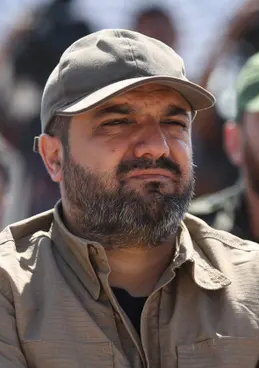
Hossein Salami was the commander-in-chief of the Islamic Revolutionary Guard Corps. He took over the role in April 2019 from Mohammed Ali Jafari.Rick Gladstone, “Iran’s Supreme Leader Replaces Head of Revolutionary Guards,” New York Times, April 21, 2019, https://www.nytimes.com/2019/04/21/world/middleeast/iran-revolutionary-guards-leader.html; “Major General Hossein Salami: Commander-in-Chief of the Islamic Revolutionary Guard Corps,” United Against Nuclear Iran, accessed August 25, 2021, https://www.unitedagainstnucleariran.com/major-general-hossein-salami-commander-chief-of-islamic-revolutionary-guard-corps. Salami died during a series of Israeli airstrikes on Iran’s nuclear and military facilities on June 13, 2025.Jon Gambrell and Josef Federman, “Israel strikes Iran’s nuclear and military sites, and kills its top generals,” Associated Press, June 13, 2025, https://apnews.com/article/iran-explosions-israel-tehran-00234a06e5128a8aceb406b140297299.
Salami joined the IRGC upon the outbreak of the Iran-Iraq War in September 1980. That year, he joined the IRGC’s Isfahan branch and fought against Iraq from Iranian Kurdistan. He was promoted to commander and led the Karbala and 14th Imam Hussein divisions before taking command of the naval Nouh headquarters. Following the end of the Iran-Iraq War, Salami completed a master’s degree in defense management at the staff college of Islamic Republic of Iran Army. He went on to serve as head of operations at the IRGC Joint Staff from 1997 to 2005.Ali Alfoneh, “Picking a new IRGC commander from the old guard,” The Arab Weekly (London), April 28, 2019, https://thearabweekly.com/picking-new-irgc-commander-old-guard; “Major General Hossein Salami: Commander-in-Chief of the Islamic Revolutionary Guard Corps,” United Against Nuclear Iran, accessed August 25, 2021, https://www.unitedagainstnucleariran.com/major-general-hossein-salami-commander-chief-of-islamic-revolutionary-guard-corps.
Salami was the subject of international sanctions in relation to Iran’s nuclear program. The U.N. Security Council imposed economic sanctions on Salami—then commander of the IRGC’s air force—in December 2006 because of his involvement with Iran’s ballistic missile program.“Security Council Imposes Sanctions on Iran for Failure to Halt Uranium Enrichment, Unanimously Adopting Resolution 1737 (2006),” U.N. Security Council, December 23, 2006, https://www.un.org/press/en/2006/sc8928.doc.htm. The U.S. government sanction-designated Salami in October 2007 under Executive Order 13382, which specifically targets the assets of proliferators of weapons of mass destruction and their supporters.“Treasury and State Department Iran Designations Identifier Information Pursuant to E.O. 13224 (Terrorism) and E.O. 13382 (WMD) October 25, 2007,” U.S. Department of the Treasury, October 25, 2007, https://www.treasury.gov/press-center/press-releases/Documents/hp644report.pdf. The European Union sanctioned Salami and seven other Iranian officials on April 12, 2021, for their response to the November 2019 demonstrations in Iran.Official Journal of the European Union, “COUNCIL IMPLEMENTING DECISION (CFSP) 2021/585 of 12 April 2021,” Eur-Lex, April 12, 2021, https://eur-lex.europa.eu/legal-content/EN/TXT/?uri=uriserv%3AOJ.LI.2021.124.01.0007.01.ENG&toc=OJ%3AL%3A2021%3A124I%3ATOC; “Iran: Council concludes annual review of the EU’s Iran human rights sanctions regime,” European Council, April 12, 2021, https://www.consilium.europa.eu/en/press/press-releases/2021/04/12/iran-council-reviews-eu-human-rights-sanctions-regime/.
Salami was appointed deputy commander of the IRGC in 2009 after serving as commander of the IRGC Air Force for three years.Michael Segall, “New IRGC commander known for threats against US, Israel,” Jewish News Syndicate, April 24, 2019, https://www.jns.org/new-irgc-commander-known-for-threats-against-us-israel/. On April 21, 2019, Iranian Supreme Leader Ali Khameini promoted Salami to the rank of major general and appointed him commander-in-chief of the IRGC.Rick Gladstone, “Iran’s Supreme Leader Replaces Head of Revolutionary Guards,” New York Times, April 21, 2019, https://www.nytimes.com/2019/04/21/world/middleeast/iran-revolutionary-guards-leader.html; “IRGC commander leaves sooner than expected,” Al-Monitor, April 22, 2019, https://www.al-monitor.com/pulse/originals/2019/04/iran-irgc-new-commander-jafari-salami-khamenei-trump.html.
Salami was known for taking a hard line against Iran’s adversaries, particularly the United States and Israel. He has warned that Iran remains vigilant of its enemies’ plots and Iranian deterrence has forced the country’s enemies to change their strategies.“IRGC vigilant towards enemy plots: Commander,” Islamic Republic News Agency, September 15, 2015, https://en.irna.ir/news/81760617/IRGC-vigilant-towards-enemy-plots-Commander. After a January 2019 Israeli strike against Iranian targets in Syria, Salami said on Iranian television that Iran’s strategy is to wipe “the Zionist regime” off the political map.Parisa Hafezi, “Khamenei names new chief for Iran’s Revolutionary Guards,” Reuters, April 21, 2019, https://www.reuters.com/article/us-iran-guards/khamenei-names-new-chief-for-irans-revolutionary-guards-idUSKCN1RX0JN. He has also predicted the collapse of the Saudi government.“Saudi Arabia to collapse over ‘sectarian’ policies: Iranian general,” Tehran Times, January 9, 2016, https://www.tehrantimes.com/news/252067/Saudi-Arabia-to-collapse-over-sectarian-policies-Iranian-general.
Salami boasted of Iran’s military and strategic power. He declared that Iran had become a regional power and is on the verge of becoming a world power.“IRGC General: Iran Becoming A World Power,” Tasnim News Agency, March 7, 2019, https://www.tasnimnews.com/en/news/2019/03/07/1963512/irgc-general-iran-becoming-a-world-power. Salami had also stated his belief that Western hegemony over the Muslim world has ended and the Western powers face “dooms day,” having failed to curb Iran’s rise to power.“IRGC commander: Collapse of Western hegemony,” Islamic Republic News Agency, October 14, 2015, https://en.irna.ir/news/81799342/IRGC-commander-Collapse-of-Western-hegemony. Salami had previously welcomed the prospect of military conflict with both the United States and Israel.Michael Segall, “Iran’s New Revolutionary Guards Commander Threatens the U.S. and Israel,” Jerusalem Center for Public Affairs, April 24, 2019, http://jcpa.org/irans-new-revolutionary-guards-commander-threatens-the-u-s-and-israel/#sdendnote6sym; “Thousands rally in Iran on al-Quds day,” Al Jazeera, July 1, 2016, https://www.aljazeera.com/news/2016/07/thousands-rally-iran-al-quds-day-160701140624059.html. After a February 13, 2019, car bombing killed 27 IRGC members in Iran, Salami declared that Iran would “break” the United States, Israel, and Saudi Arabia. He stated that the United States had already been defeated, while Israel was struggling to survive. According to Salami, Iran had “plans to defeat the world powers.”“Iran official warns Gulf countries of uprising if they continue to rely on the US,” Al Arabiya, March 3, 2019, https://english.alarabiya.net/en/News/middle-east/2019/03/03/Iran-official-warns-Gulf-countries-of-uprising-if-they-continue-to-rely-on-the-US.html.
On September 14, 2023, French prosecutors filed a criminal complaint against Salami, IRGC Quds Force commander Ismail Ghaani, and Iranian Intelligence Minister smail Khatib. According to the complaint brought by six Iranian and Franco-Iranian plaintiffs, between December 2022 and January 2023 the three defendants issued death threats and justified terrorism against people supporting Iranian protests over the death of Mahsa Amini. Amini died in Iranian custody on September 16, 2022, for violating Iran’s female dress code.Agence France-Presse, “Iran Revolutionary Guards chief targeted in French criminal complaint,” France 24, September 14, 2023, https://www.france24.com/en/live-news/20230914-iran-revolutionary-guards-chief-targeted-in-french-criminal-complaint.
On April 1, 2024, a suspected Israeli airstrike targeted an Iranian consulate building in Damascus, Syria, killing seven IRGC commanders. Khamenei pledged on April 10 that Israel would be “punished.”“Iran says Israel bombs its embassy in Syria, kills commanders,” Reuters, April 2, 2024, https://www.reuters.com/world/middle-east/israel-bombs-iran-embassy-syria-iranian-commanders-among-dead-2024-04-01/; “Khamenei says Israel ‘must be punished’ for Syria embassy attack,” Reuters, April 10, 2024, https://www.reuters.com/world/middle-east/irans-khamenei-says-israel-must-be-punished-syria-embassy-attack-2024-04-10/. On April 13, 2024, Iran launched its first-ever direct attack on Israel, sending more than 300 drones and rockets toward the Jewish state. Israeli, U.S., and U.K. forces, along with regional allies, shot down 99 percent of the projectiles. The projectiles that did strike Israel caused minor damage to a military base and wounded a child in southern Israel. Iran labeled the attack a success.Faris Tanyos, Cara Tabachnick, and Tucker Reals, “Israel says Iran’s missile and drone attack largely thwarted, with ‘very little damage’ caused,” CBS News, April 14, 2024, https://www.cbsnews.com/news/iran-launches-drone-attack-toward-israel-idf-says/; Benoit Faucon, “Iranian President Hails Attack as ‘Lesson’ for Israel,” Wall Street Journal, April 15, 2024, https://www.wsj.com/livecoverage/israel-iran-strikes-live-coverage/card/iranian-president-hails-attack-as-lesson-for-israel-BVxr8zGc765oyK1yFQnW. Salami claimed the attack created a new paradigm in the region. He warned that if Israel attacks Iranian interests in the future, Iran will respond directly.Susannah George, “Iran crosses old red lines and sets ‘new equation’ with attack on Israel,” Washington Post, April 14, 2024, https://www.washingtonpost.com/world/2024/04/14/iran-israel-attack-missiles-drones/.
During a gathering of IRGC commanders on June 12, 2025, Salami declared that Iran was ready for any military confrontation and has a defined strategy if Israel attacks.“Iran ready for any military scenario, Revolutionary Guard chief says,” Iran International, June 12, 2025, https://www.iranintl.com/en/202506126484. Early in the morning on June 13, Israel launched Operation Rising Lion, a preemptive strike on Iranian nuclear and ballistic missile sites, including Iran’s main uranium enrichment facility at Natanz. Israeli Prime Minister Benjamin Netanyahu said that the multiple waves of Israeli attacks were targeting Natanz, nuclear and military sites, Iranian scientists working on a nuclear bomb, and military officials associated with Iran’s ballistic missile programs. The IRGC’s headquarters in Tehran was reportedly on fire during the attack and reports emerged that Salami had been killed. On June 13, the IRGC confirmed Salami’s death and threatened to take “severe and regretful revenge.”Jon Gambrell and Josef Federman, “Israel attacks Iran’s capital with explosions booming across Tehran,” Associated Press, June 12, 2025, https://apnews.com/article/iran-explosions-israel-tehran-00234a06e5128a8aceb406b140297299; “IRGC VOWS ‘SEVERE AND REGRETFUL REVENGE,’” Iran Wire, June 13, 2025, https://iranwire.com/en/news/142013-irgc-vows-severe-and-regretful-revenge/. The IRGC accused the “vile rulers of the White House and the terrorist American regime” of complicity in the strikes.“IRGC VOWS ‘SEVERE AND REGRETFUL REVENGE,’” Iran Wire, June 13, 2025, https://iranwire.com/en/news/142013-irgc-vows-severe-and-regretful-revenge/. Khamenei accused Israel of unleashing “its wicked and bloody” hand. He threatened that Israel would suffer “a bitter fate.”Jerusalem Post staff and Reuters, “Khamenei: Israel should expect a 'harsh' punishment after strikes on Iran,” Jerusalem Post, June 13, 2025, https://www.jpost.com/middle-east/iran-news/article-857593.
- Hosein Salimi“Treasury and State Department Iran Designations Identifier Information Pursuant to E.O. 13224 (Terrorism) and E.O. 13382 (WMD) October 25, 2007,” U.S. Department of the Treasury, October 25, 2007, https://www.treasury.gov/press-center/press-releases/Documents/hp644report.pdf.
- Hoseyn Salami“Treasury and State Department Iran Designations Identifier Information Pursuant to E.O. 13224 (Terrorism) and E.O. 13382 (WMD) October 25, 2007,” U.S. Department of the Treasury, October 25, 2007, https://www.treasury.gov/press-center/press-releases/Documents/hp644report.pdf.
- Hussayn Salami“Treasury and State Department Iran Designations Identifier Information Pursuant to E.O. 13224 (Terrorism) and E.O. 13382 (WMD) October 25, 2007,” U.S. Department of the Treasury, October 25, 2007, https://www.treasury.gov/press-center/press-releases/Documents/hp644report.pdf.
United States

The U.S. Department of the Treasury sanction-designated Hosein Salimi as a Specially Designated Global Terrorist under Executive Order 13382 on the basis of his relationship to the IRGC on October 25, 2007.“Recent OFAC Actions,” U.S. Department of the Treasury, October 25, 2007, https://www.treasury.gov/resource-center/sanctions/OFAC-Enforcement/pages/20071025.aspx; “Fact Sheet: Designation of Iranian Entities and Individuals for Proliferation Activities and Support for Terrorism,” U.S. Department of the Treasury, October 25, 2007, https://m.treasury.gov/press-center/press-releases/Pages/hp644.aspx.
United Nations

The U.N. Security Council imposed financial sanctions on Hosein Salimi on December 23, 2006, in an annex to U.N. Security Council Resolution 1737 because of his involvement with Iran’s ballistic missile program.“Security Council Imposes Sanctions on Iran for Failure to Halt Uranium Enrichment, Unanimously Adopting Resolution 1737 (2006),” U.N. Security Council, December 23, 2006, https://www.un.org/press/en/2006/sc8928.doc.htm.
European Union

The European Union sanctioned Hossein Salami and seven other Iranian officials on April 12, 2021, for their response to the November 2019 demonstrations in Iran.Official Journal of the European Union, “COUNCIL IMPLEMENTING DECISION (CFSP) 2021/585 of 12 April 2021,” Eur-Lex, April 12, 2021, https://eur-lex.europa.eu/legal-content/EN/TXT/?uri=uriserv%3AOJ.LI.2021.124.01.0007.01.ENG&toc=OJ%3AL%3A2021%3A124I%3ATOC; “Iran: Council concludes annual review of the EU’s Iran human rights sanctions regime,” European Council, April 12, 2021, https://www.consilium.europa.eu/en/press/press-releases/2021/04/12/iran-council-reviews-eu-human-rights-sanctions-regime/.
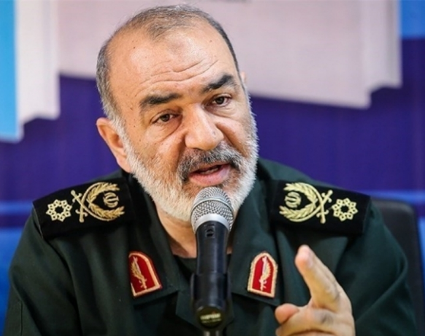
Mohammed Atef was a high-ranking al-Qaeda military commander and loyal associate of Osama bin Laden. He was involved in several terrorist attacks, including the 1998 U.S. Embassy bombings in Kenya and Tanzania and the September 11, 2001 terrorist attacks in the United States. Atef was killed in a U.S. airstrike in Afghanistan in November 2001. Ten months prior, bin Laden had personally nominated him as his replacement.“Abu Hafs al-Masri,” Combating Terrorism Center, accessed April 8, 2019, https://ctc.usma.edu/app/uploads/2011/06/Abu_Hafs.pdf; “The 9/11 Commission Report,” National Commission on Terrorist Attacks upon the United States, accessed April 10, 2019, http://govinfo.library.unt.edu/911/report/911Report.pdf.
Atef briefly studied at Assiut University in Egypt, but dropped out and joined the Egyptian Islamic Jihad (EIJ), a militant Islamist group that aimed to overthrow the Egyptian government and merged with al-Qaeda in 1998. Atef joined the Egyptian police force in 1980, in order to help EIJ militants to seize weapons from Egyptian authorities in their fight against Hosni Mubarak’s regime. Atef eventually became a top aide to EIJ founder Ayman Zawahiri, who has led al-Qaeda since bin Laden’s death in 2011.“Abu Hafs al-Masri,” Combating Terrorism Center, accessed April 8, 2019, https://ctc.usma.edu/app/uploads/2011/06/Abu_Hafs.pdf; Holly Fletcher, “Egyptian Islamic Jihad,” Council on Foreign Relations, May 29, 2008, https://www.cfr.org/backgrounder/egyptian-islamic-jihad; “‘Most-Wanted Terrorists,’” Washington Post, accessed April 10, 2019, https://www.washingtonpost.com/archive/politics/2001/10/11/most-wanted-terrorists/673bf81c-94d3-4bc7-b25d-1b7b7e32ba54/?utm_term=.a14a16f8cb8b; “Most Wanted Terrorists: Ayman Al-Zawahiri,” FBI, accessed August 7, 2017, https://www.fbi.gov/wanted/wanted_terrorists/ayman-al-zawahiri. In 1999, an Egyptian court sentenced Atef to seven years in prison in absentia for his activities with the EIJ.“Taliban confirms death of Osama bin Laden’s military chief in U.S. strike,” Houston Chronicle, November 17, 2001, https://www.chron.com/news/article/Taliban-confirms-death-of-Osama-bin-Laden-s-2035185.php.
The Egyptian government’s crackdown on EIJ militants in the mid-1980s caused Atef and others to flee the country. Atef traveled to Pakistan and later Afghanistan to join the anti-Soviet jihad.“Abu Hafs al-Masri,” Combating Terrorism Center, accessed April 8, 2019, https://ctc.usma.edu/app/uploads/2011/06/Abu_Hafs.pdf; “'Most-Wanted Terrorists',” Washington Post, accessed April 10, 2019, https://www.washingtonpost.com/archive/politics/2001/10/11/most-wanted-terrorists/673bf81c-94d3-4bc7-b25d-1b7b7e32ba54/?utm_term=.a14a16f8cb8b. There, he met with bin Laden and the so-called “father of global jihad,” Abdullah Azzam, a Palestinian Islamist preacher who later helped found al-Qaeda.“Abu Hafs al-Masri,” Combating Terrorism Center, accessed April 8, 2019, https://ctc.usma.edu/app/uploads/2011/06/Abu_Hafs.pdf; Bruce Riedel, “The 9/11 Attacks’ Spiritual Father,” Daily Beast, September 11, 2011, http://www.thedailybeast.com/articles/2011/09/11/abdullah-azzam-spiritual-father-of-9-11-attacks-ideas-live-on.html; Roland Jacquard, In the Name of Osama Bin Laden (Durham: Duke University Press: 2002), 59; Chris Suellentrop, “Abdullah Azzam: the godfather of jihad,” Slate, April 16, 2002, http://www.slate.com/articles/news_and_politics/assessment/2002/04/abdullah_azzam.html. In 1987, Atef started to work for bin Laden and Azzam’s Maktab al-Khidmat, or Services Bureau, which facilitated travel arrangements for jihadists willing to fight the Soviets in Afghanistan. Eager to fight himself, Atef helped to establish the Lion’s Den (Masada), an all-Arab jihadist training facility near Jaji, a town in the Paktia province in Eastern Afghanistan.“Abu Hafs al-Masri,” Combating Terrorism Center, accessed April 8, 2019, https://ctc.usma.edu/app/uploads/2011/06/Abu_Hafs.pdf; “Abu ‘Ubayda al-Banshiri,” Combating Terrorism Center, accessed April 9, 2019, https://ctc.usma.edu/app/uploads/2011/06/Abu_Ubayda_al-Banshiri.pdf; “Context of ‘May 1987: Bin Laden-Led Force Holds Out against Soviets at Battle of Lion’s Den, Wins Big Propaganda Victory,’” History Commons, accessed April 16, 2019, http://www.historycommons.org/context.jsp?item=a0587battleoflionsden; World Heritage Encyclopedia, “Battle Of Jaji,” Project Gutenberg Self-Publishing Press, accessed April 16, 2019, http://self.gutenberg.org/articles/eng/Battle_of_Jaji. The camp was located in close proximity to a large Soviet military compound and was attacked in 1987. The jihadists were clearly outnumbered by Soviet forces, but were able to cause them to retreat after several successful counterattacks. The jihadists maintained their position for weeks, but bin Laden ultimately ordered his men to return as he feared substantial losses. Nonetheless, bin Laden and his group—which later became al-Qaeda—gained widespread attention for this victory against the Soviets, and Atef became al-Qaeda’s security chief responsible for bin Laden’s safety. He also assumed the role as deputy military commander, behind Abu Ubayda al-Banshiri (a.k.a. Ali Amin Ali al-Rashidi), bin Laden’s second-in-command who died in 1996.“Abu Hafs al-Masri,” Combating Terrorism Center, accessed April 8, 2019, https://ctc.usma.edu/app/uploads/2011/06/Abu_Hafs.pdf; “Abu ‘Ubayda al-Banshiri,” Combating Terrorism Center, accessed April 9, 2019, https://ctc.usma.edu/app/uploads/2011/06/Abu_Ubayda_al-Banshiri.pdf; “Context of ‘May 1987: Bin Laden-Led Force Holds Out against Soviets at Battle of Lion’s Den, Wins Big Propaganda Victory,’” History Commons, accessed April 16, 2019, http://www.historycommons.org/context.jsp?item=a0587battleoflionsden; World Heritage Encyclopedia, “Battle Of Jaji,” Project Gutenberg Self-Publishing Press, accessed April 16, 2019, http://self.gutenberg.org/articles/eng/Battle_of_Jaji.
In 1992, Atef followed bin Laden to the Sudan, where he recruited, vetted, and trained new al-Qaeda members, set up cells, and planned and facilitated terrorist attacks. Atef also directed other senior militants and trainers, and helped establish front companies in Kenya to finance al-Qaeda’s activities throughout Africa. He was also responsible for connecting with local tribes in Somalia and offer assistance for those opposed to U.N. and U.S. intervention.“Abu Hafs al-Masri,” Combating Terrorism Center, accessed April 8, 2019, https://ctc.usma.edu/app/uploads/2011/06/Abu_Hafs.pdf; “‘Most-Wanted Terrorists,’” Washington Post, accessed April 10, 2019, https://www.washingtonpost.com/archive/politics/2001/10/11/most-wanted-terrorists/673bf81c-94d3-4bc7-b25d-1b7b7e32ba54/?utm_term=.a14a16f8cb8b. In this respect, Atef allegedly provided support to Somali militias and tribes and helped plan the October 1993 assault on U.S. Army Rangers in Somalia, which left 18 Americans dead and 73 injured.“Abu Hafs al-Masri,” Combating Terrorism Center, accessed April 8, 2019, https://ctc.usma.edu/app/uploads/2011/06/Abu_Hafs.pdf; “‘Most-Wanted Terrorists,’” Washington Post, accessed April 10, 2019, https://www.washingtonpost.com/archive/politics/2001/10/11/most-wanted-terrorists/673bf81c-94d3-4bc7-b25d-1b7b7e32ba54/?utm_term=.a14a16f8cb8b; Todd South, “The Battle of Mogadishu 25 years later: How the fateful fight changed combat operations,” Army Times, October 2, 2018, https://www.armytimes.com/news/your-army/2018/10/02/the-battle-of-mogadishu-25-years-later-how-the-fateful-fight-changed-combat-operations/.
After Banshiri’s death in 1996, Atef became the primary military commander of al-Qaeda.“Abu Hafs al-Masri,” Combating Terrorism Center, accessed April 8, 2019, https://ctc.usma.edu/app/uploads/2011/06/Abu_Hafs.pdf; “‘Most-Wanted Terrorists,’” Washington Post, accessed April 10, 2019, https://www.washingtonpost.com/archive/politics/2001/10/11/most-wanted-terrorists/673bf81c-94d3-4bc7-b25d-1b7b7e32ba54/?utm_term=.a14a16f8cb8b. The same year, Atef returned to Afghanistan, where he oversaw the training at al-Qaeda’s terrorist camps and selected those recruits who would receive additional instructions, including suicide missions, targeted assassinations, and, among other things, making bombs and poisons. He also worked as bin Laden’s media adviser and arranged interviews with Western reporters. Moreover, Atef advocated and ultimately convinced bin Laden to pursue the means to produce and acquire weapons of mass destruction (WMD).“Abu Hafs al-Masri,” Combating Terrorism Center, accessed April 8, 2019, https://ctc.usma.edu/app/uploads/2011/06/Abu_Hafs.pdf; “‘Most-Wanted Terrorists,’” Washington Post, accessed April 10, 2019, https://www.washingtonpost.com/archive/politics/2001/10/11/most-wanted-terrorists/673bf81c-94d3-4bc7-b25d-1b7b7e32ba54/?utm_term=.a14a16f8cb8b.
Also in 1996, Atef and bin Laden met with Khalid Sheikh Muhammed (a.k.a. KSM) to discuss several terrorist plots, including KSM’s plan to use airplanes as weapons to attack U.S. targets. This concept would form the cornerstone of the September 11, 2001, terrorist attack against the United States.“Abu Hafs al-Masri,” Combating Terrorism Center, accessed April 8, 2019, https://ctc.usma.edu/app/uploads/2011/06/Abu_Hafs.pdf; “The 9/11 Commission Report,” National Commission on Terrorist Attacks upon the United States, accessed April 10, 2019, http://govinfo.library.unt.edu/911/report/911Report.pdf. The FBI placed Atef on their Most Wanted list following the 9/11 attacks, where he was known to have played a key role.“Profile: Abu Hafs al-Masri,” Al-Jazeera, March 13, 2004, https://www.aljazeera.com/archive/2004/03/20084101411479750.html; “The 9/11 Commission Report,” National Commission on Terrorist Attacks upon the United States, accessed April 10, 2019, http://govinfo.library.unt.edu/911/report/911Report.pdf.
In November 1997, Atef and Zawahiri reportedly orchestrated the terrorist attack at Deir el-Bahari, an archaeological site and major tourist attraction located near Luxor, Egypt. The attack killed 62 people, mostly tourists, and became known as the Luxor massacre.“Profile: Abu Hafs al-Masri,” Al-Jazeera, March 13, 2004, https://www.aljazeera.com/archive/2004/03/20084101411479750.html; “November 17: On This Day in World History … briefly,” South Coast Herald, November 17, 2018, https://southcoastherald.co.za/328238/november-17-day-world-history-briefly/.
On August 7, 1998, nearly simultaneous bombs exploded in front of the U.S. embassies in Nairobi, Kenya, and Dar es Salaam, Tanzania, killing a total of 224 people and wounding more than 5,000 others. The attacks were directly linked to al-Qaeda.“Wanted: Sayf al-Adl,” U.S. Department of State, Rewards for Justice Program, accessed March 25, 2019, https://rewardsforjustice.net/english/saif_al_adel.html; “East African Embassy Bombings,” Federal Bureau of Investigation, accessed March 26, 2019, https://www.fbi.gov/history/famous-cases/east-african-embassy-bombings. In November 1998, a U.S. grand jury indicted more than 20 people—including Atef—for their involvement.“United States of America vs. Osama bin Laden et al. - Indictment” U.S. District Court, Southern District of New York, accessed March 26, 2019, https://www.nonproliferation.org/wp-content/uploads/2016/05/us_indictment_against_bin_laden.pdf; “‘Most wanted terrorists’ list released,” CNN, October 10, 2001, http://www.cnn.com/2001/US/10/10/inv.mostwanted.list/.
In January 2001, Atef’s daughter married bin Laden’s son Mohamed in Kandahar, Afghanistan.“‘Most wanted terrorists’ list released,” CNN, October 10, 2001, http://www.cnn.com/2001/US/10/10/inv.mostwanted.list/; “Muhammad Atef,” Encyclopaedia Britannica, accessed April 10, 2019, https://www.britannica.com/biography/Muhammad-Atef. On November 9, 2001, the Taliban government announced they were bestowing official Afghan citizenship on Atef, as well as bin Laden, Zawahiri, and Shaykh Asim Abdulrahman.“Taliban grants Osama citizenship,” The Hindu, accessed April 10, 2019, https://www.thehindu.com/2001/11/10/stories/03100007.htm.
Atef was killed in a U.S. airstrike in Afghanistan in November 2001. His death represented a significant setback for bin Laden and al-Qaeda, as Atef was considered one of the terrorist group’s most talented and trusted members.“Abu Hafs al-Masri,” Combating Terrorism Center, accessed April 8, 2019, https://ctc.usma.edu/app/uploads/2011/06/Abu_Hafs.pdf; “Muhammad Atef,” Encyclopaedia Britannica, accessed April 10, 2019, https://www.britannica.com/biography/Muhammad-Atef.
- Abu Hafs Al-Masri“OFAC Sanctions List Search,” U.S. Department of the Treasury, accessed April 8, 2019, https://sanctionssearch.ofac.treas.gov/Details.aspx?id=246.
- Abu Hafs“OFAC Sanctions List Search,” U.S. Department of the Treasury, accessed April 8, 2019, https://sanctionssearch.ofac.treas.gov/Details.aspx?id=246.
- Abu Hafs el Masry El Khabir“OFAC Sanctions List Search,” U.S. Department of the Treasury, accessed April 8, 2019, https://sanctionssearch.ofac.treas.gov/Details.aspx?id=246.
- Al Khabir“Abu Hafs al-Masri,” Combating Terrorism Center, accessed April 8, 2019, https://ctc.usma.edu/app/uploads/2011/06/Abu_Hafs.pdf.
- Muhammad Atef“OFAC Sanctions List Search,” U.S. Department of the Treasury, accessed April 8, 2019, https://sanctionssearch.ofac.treas.gov/Details.aspx?id=246.
- Muhammad Atif“OFAC Sanctions List Search,” U.S. Department of the Treasury, accessed April 8, 2019, https://sanctionssearch.ofac.treas.gov/Details.aspx?id=246.
- Mohamed Atif“OFAC Sanctions List Search,” U.S. Department of the Treasury, accessed April 8, 2019, https://sanctionssearch.ofac.treas.gov/Details.aspx?id=246.
- Sheikh Taysir Abdullah“OFAC Sanctions List Search,” U.S. Department of the Treasury, accessed April 8, 2019, https://sanctionssearch.ofac.treas.gov/Details.aspx?id=246.
- Sheikh Tasser Abdullah“Abu Hafs al-Masri,” Combating Terrorism Center, accessed April 8, 2019, https://ctc.usma.edu/app/uploads/2011/06/Abu_Hafs.pdf.
- Taysir“OFAC Sanctions List Search,” U.S. Department of the Treasury, accessed April 8, 2019, https://sanctionssearch.ofac.treas.gov/Details.aspx?id=246.
- Subhi Abu Sitta“OFAC Sanctions List Search,” U.S. Department of the Treasury, accessed April 8, 2019, https://sanctionssearch.ofac.treas.gov/Details.aspx?id=246.
- Subhi Abu Sittah“Abu Hafs al-Masri,” Combating Terrorism Center, accessed April 8, 2019, https://ctc.usma.edu/app/uploads/2011/06/Abu_Hafs.pdf.
- Subhi Abd-al-Aziz Abu-Sittah“Abu Hafs al-Masri,” Combating Terrorism Center, accessed April 8, 2019, https://ctc.usma.edu/app/uploads/2011/06/Abu_Hafs.pdf.
- Abu Fatima“Abu Hafs al-Masri,” Combating Terrorism Center, accessed April 8, 2019, https://ctc.usma.edu/app/uploads/2011/06/Abu_Hafs.pdf.
- Sobhi Abdel Aziz Mohamed El Gohary Abu Sinna“Security Council Al-Qaida Sanctions Committee Deletes Eight Individuals from Its Sanctions List,” United Nations Security Council, July 3, 2012, https://www.un.org/press/en/2012/sc10697.doc.htm.
United States

The U.S. Department of State designated Mohammed Atef a Specially Designated Global Terrorist under Executive Order 13224 on September 23, 2001.“Executive Order 13224,” U.S. Department of State, September 23, 2001, https://www.state.gov/j/ct/rls/other/des/122570.htm.
United Nations

The United Nations Security Council added Mohammed Atef to its Al-Qaida Sanctions List on January, 25, 2001 (amended on November 26, 2004, March 24, 2009, and May 13, 2011). On 2 July 2012, the Security Council Committee pursuant to resolutions 1267 (1999) and 1989 (2011) approved the deletion (delisting) of Mohammed Atef from the Al-Qaida Sanctions List.“Security Council Al-Qaida Sanctions Committee Deletes Eight Individuals from Its Sanctions List,” United Nations Security Council, July 3, 2012, https://www.un.org/press/en/2012/sc10697.doc.htm.
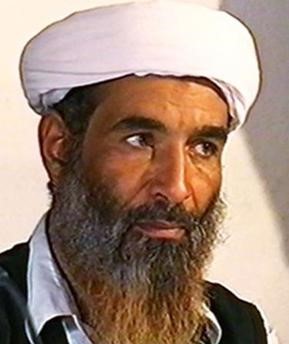
Zaher Jabarin is a senior leader of Hamas, and currently serves as the group’s top financial officer.Judah Ari Gross, “Shin Bet accuses Turkey of allowing Hamas to raise, launder money,” Times of Israel, February 12, 2018, https://www.timesofisrael.com/arab-israeli-man-turkish-citizen-arrested-for-helping-to-fund-hamas/. Jabarin was a convicted terrorist held in Israeli custody until 2011, when he was released as part of a prisoner exchange deal for captured Israeli soldier Gilad Shalit. Following his release, he resettled in Turkey and rejoined Hamas as a senior leader.Judah Ari Gross, “Shin Bet accuses Turkey of allowing Hamas to raise, launder money,” Times of Israel, February 12, 2018, https://www.timesofisrael.com/arab-israeli-man-turkish-citizen-arrested-for-helping-to-fund-hamas/. He served as a senior military commander for Hamas, working with deputy Hamas leader Saleh al-Arouri to promote terrorist operations in the West Bank.Judah Ari Gross, “Shin Bet accuses Turkey of allowing Hamas to raise, launder money,” Times of Israel, February 12, 2018, https://www.timesofisrael.com/arab-israeli-man-turkish-citizen-arrested-for-helping-to-fund-hamas/; Yoav Zitun, “Turkish law lecturer aided Hamas, deported from Israel,” Ynet News, February 12, 2018, https://www.ynetnews.com/articles/0,7340,L-5109465,00.html. In 2012, Jabarin gave an interview to the Hamas-affiliated Al Quds TV about the group’s efforts to indoctrinate youth to become suicide bombers.“Zaher Jabarin, Hamas military commander, Talks About Indoctrination to Jihad,” YouTube video, posted January 20, 2013, https://www.youtube.com/watch?v=qX4X07o56OA. In August 2017, he represented Hamas in a delegation meeting with members of Iran’s Islamic Revolutionary Guard Corps in Tehran.Dov Lieber, “Hamas said to meet with Iranian Revolution Guards in Tehran,” Times of Israel, August 8, 2017, https://www.timesofisrael.com/hamas-said-to-meet-with-iranian-revolutionary-guards-in-tehran/.
As the top financial manager for Hamas, Jabarin has recruited individuals to facilitate money laundering operations for the group in Turkey.Judah Ari Gross, “Shin Bet accuses Turkey of allowing Hamas to raise, launder money,” Times of Israel, February 12, 2018, https://www.timesofisrael.com/arab-israeli-man-turkish-citizen-arrested-for-helping-to-fund-hamas/; Yoav Zitun, “Turkish law lecturer aided Hamas, deported from Israel,” Ynet News, February 12, 2018, https://www.ynetnews.com/articles/0,7340,L-5109465,00.html. Two of these individuals, Turkish national Cemil Tekeli and Arab Israeli citizen Durgham Jabarin (no relation), were arrested in Israel in January 2018.Judah Ari Gross, “Shin Bet accuses Turkey of allowing Hamas to raise, launder money,” Times of Israel, February 12, 2018, https://www.timesofisrael.com/arab-israeli-man-turkish-citizen-arrested-for-helping-to-fund-hamas/; Yoav Zitun, “Turkish law lecturer aided Hamas, deported from Israel,” Ynet News, February 12, 2018, https://www.ynetnews.com/articles/0,7340,L-5109465,00.html; Anna Ahronheim, “Arab-Israeli, Turkish citizen arrested for aiding Hamas,” Jerusalem Post, February 12, 2018, http://www.jpost.com/Arab-Israeli-Conflict/Arab-Israeli-Turkish-citizen-arrested-for-aiding-Hamas-542411. An investigation revealed that Zaher Jabarin had recruited Tekeli to help Hamas members set up businesses, acquire visas, and obtain commercial property in Turkey.Judah Ari Gross, “Shin Bet accuses Turkey of allowing Hamas to raise, launder money,” Times of Israel, February 12, 2018, https://www.timesofisrael.com/arab-israeli-man-turkish-citizen-arrested-for-helping-to-fund-hamas/. One of these Hamas members, another former Israeli prisoner named Salameh Mar’i, became Zaher Jabarin’s chief aide.Yoav Zitun, “Turkish law lecturer aided Hamas, deported from Israel,” Ynet News, February 12, 2018, https://www.ynetnews.com/articles/0,7340,L-5109465,00.html.
Zaher Jabarin and Mar’i both guided the financial activities of Durgham Jabarin, who was arrested three weeks after Tekeli.Judah Ari Gross, “Shin Bet accuses Turkey of allowing Hamas to raise, launder money,” Times of Israel, February 12, 2018, https://www.timesofisrael.com/arab-israeli-man-turkish-citizen-arrested-for-helping-to-fund-hamas/; Yoav Zitun, “Turkish law lecturer aided Hamas, deported from Israel,” Ynet News, February 12, 2018, https://www.ynetnews.com/articles/0,7340,L-5109465,00.html. They reportedly disguised their contact as commercial activity for a Hamas-owned company called IMES.Yoav Zitun, “Turkish law lecturer aided Hamas, deported from Israel,” Ynet News, February 12, 2018, https://www.ynetnews.com/articles/0,7340,L-5109465,00.html. Upon his arrest, authorities found that Durgham Jabarin was planning to transfer 91,000 euros to the West Bank, which were reportedly intended to be used to fund Hamas’s military infrastructure.Judah Ari Gross, “Shin Bet accuses Turkey of allowing Hamas to raise, launder money,” Times of Israel, February 12, 2018, https://www.timesofisrael.com/arab-israeli-man-turkish-citizen-arrested-for-helping-to-fund-hamas/; Yoav Zitun, “Turkish law lecturer aided Hamas, deported from Israel,” Ynet News, February 12, 2018, https://www.ynetnews.com/articles/0,7340,L-5109465,00.html. According to Shin Bet, Israel’s internal security service, “investigation findings have revealed wide-ranging Hamas activity in money laundering in Turkey on instruction from Zaher Jabarin.”“Hamas Operations in Turkey,” Israel Ministry of Foreign Affairs, February 12, 2018, http://mfa.gov.il/MFA/ForeignPolicy/Terrorism/Pages/Hamas-operations-in-Turkey-12-February-20180212-53.aspx.
United States

The U.S. Department of the Treasury’s Office of Foreign Assets Control designated Zaher Jabarin as a Specially Designated Global Terrorist under Executive Order 13224 on September 10, 2019.“Treasury Targets Wide Range of Terrorists and Their Supporters Using Enhanced Counterterrorism Sanctions Authorities,” U.S. Department of the Treasury, September 10, 2019, https://home.treasury.gov/news/press-releases/sm772.

Zulfi Hoxha is an American senior commander in ISIS. He has also appeared in at least one propaganda video for the group. Before joining ISIS, Hoxha communicated with other American ISIS supporters on social media, who helped fund his travel to Syria. He departed for Syria in April 2015 and became a foreign fighter for ISIS.Seamus Hughes et al., “A New American Leader Rises in ISIS,” Atlantic, January 13, 2018, https://www.theatlantic.com/international/archive/2018/01/isis-america-hoxha/550508/.
Hoxha was born in the United States to Albanian parents. He grew up in Margate, New Jersey, and graduated from Atlantic City High School in 2010.Craig R. McCoy et al., “From Atlantic City High to ISIS: the path of a homegrown terrorist,” Philadelphia Inquirer, January 19, 2018, http://www.philly.com/philly/news/nation_world/american-isis-commander-atlantic-city-margate-zulfi-hoxha-2-20180119.html. According to his mother, he attended a mosque, where he may have been radicalized.Ariel Zilber, “‘Liberate yourself from hellfire by killing a non-believer’: Terrorist seen executing a prisoner in vile ISIS propaganda video and urging lone wolf attacks in the US is a New Jersey high school graduate,” Daily Mail (London), January 19, 2018, http://www.dailymail.co.uk/news/article-5290151/ISIS-soldier-seen-beheading-video-American.html.
Hoxha was active on social media before his departure for Syria. He reportedly operated a Twitter account on which he interacted with other ISIS supporters as well as the U.S. State Department’s “Think Again Turn Away” counter-propaganda account in October 2014. He was also active on the video gaming website Steam, where he reportedly first interacted with David Daoud Wright, a U.S.-born ISIS supporter who plotted to carry out a domestic terror attack, sometime before November 2014. Hoxha and Wright discussed their support for ISIS on Skype and the messaging app Paltalk, where they participated in pro-ISIS chatrooms and shared ISIS propaganda materials with each other, including execution videos and the magazine Dabiq. Wright and his uncle Usaamah Abdullah Rahim––who was later shot and killed by law enforcement officers after he tried to attack them with a large knife––sold a laptop on Craigslist to help Hoxha raise money for the plane ticket that he would use to travel overseas to join ISIS.Seamus Hughes et al., “A New American Leader Rises in ISIS,” Atlantic, January 13, 2018, https://www.theatlantic.com/international/archive/2018/01/isis-america-hoxha/550508/.
Hoxha departed the United States for Istanbul, Turkey, on April 6, 2015. By April 10, he had arrived at an ISIS training camp in Syria. Hoxha informed Rahim of his arrival in ISIS territory through an encrypted messaging app. After Hoxha began training, Rahim continued to receive updates on his activities from British ISIS facilitator Junaid Hussain.Seamus Hughes et al., “A New American Leader Rises in ISIS,” Atlantic, January 13, 2018, https://www.theatlantic.com/international/archive/2018/01/isis-america-hoxha/550508/. According to U.S. law enforcement, Hoxha was a senior ISIS commander as of 2017.Seamus Hughes et al., “A New American Leader Rises in ISIS,” Atlantic, January 13, 2018, https://www.theatlantic.com/international/archive/2018/01/isis-america-hoxha/550508/.
Hoxha has also represented ISIS in the group’s propaganda videos. In May 2017, Hoxha appeared in an ISIS propaganda video filmed in northwestern Iraq entitled “We Will Surely Guide Them To Our Ways.” In the video, masked and using the name “Abu Hamza al-Amriki,” Hoxha calls upon supporters to carry out domestic terror attacks within the United States. Hoxha’s identity in the video was confirmed by the the U.S. government.Seamus Hughes et al., “A New American Leader Rises in ISIS,” Atlantic, January 13, 2018, https://www.theatlantic.com/international/archive/2018/01/isis-america-hoxha/550508/. Another ISIS propaganda video released in October 2015 shows an American ISIS fighter beheading a Kurdish soldier. According to the Atlantic, the American speaks with “the same accent and inflection as Hoxha in the May 2017 release.”Seamus Hughes et al., “A New American Leader Rises in ISIS,” Atlantic, January 13, 2018, https://www.theatlantic.com/international/archive/2018/01/isis-america-hoxha/550508/.
- Abu Hamza al-AmrikiSeamus Hughes et al., “A New American Leader Rises in ISIS,” Atlantic, January 13, 2018, https://www.theatlantic.com/international/archive/2018/01/isis-america-hoxha/550508/.
Left the United States in April 2015 to join ISIS in Syria. His travel was facilitated by David Daoud Wright and Usaamah Abdullah Rahim. Became a senior commander for ISIS and has featured in at least one ISIS propaganda video himself.
Shared the ISIS propaganda magazine Dabiq and ISIS propaganda videos, including one depicting a Jordanian pilot being burned alive with David Daoud Wright on Skype and Paltalk messenger before departing for Syria.
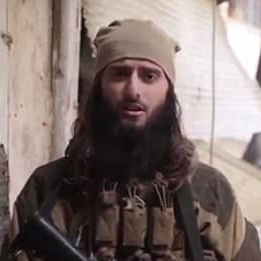
Adil Abduh Fari Uthman al-Dhubhani is a prominent military instructor and commander of an AQAP-affiliated group, and has also fundraised for AQAP. Before his involvement with AQAP, Dhubhani fought with and financed ISIS’s affiliate in Yemen.“Treasury and Terrorist Financing Targeting Certain Partners Issue First Joint Sanctions Against Key Terrorists and Supporters,” U.S. Department of the Treasury, October 25, 2017, https://www.treasury.gov/press-center/press-releases/Pages/sm0187.aspx. He was designated as a terrorist by the United States and six Gulf countries in October 2017.Thomas Joscelyn, “US and Gulf nations sanction 8 jihadists in Yemen,” Long War Journal, October 25, 2017, https://www.longwarjournal.org/archives/2017/10/us-and-gulf-nations-sanction-8-jihadists-in-yemen.php.
Dhubhani was born in Yemen’s Taiz Governorate either on July 15, 1963, or in 1971, according to the U.S. Department of the Treasury. He is a Yemeni citizen, and still resides in Taiz Governorate.“Counter Terrorism Designations,” U.S. Department of the Treasury, October 25, 2017, https://www.treasury.gov/resource-center/sanctions/OFAC-Enforcement/Pages/20171025.aspx.
Dhubhani became involved with ISIS’s affiliate in Yemen sometime after the group was established in November 2014. In June 2016, Dhubhani fought with ISIS as part of the Sunni resistance movement in Taiz Governorate. He held a leadership position, as he was reported to have “deputies” who also fought with ISIS. Later that year, in October, Dhubhani financed ISIS-associated militants in the governorate in order to “secure continued support” for ISIS’s activities in Taiz, according to the U.S. Treasury Department.“Treasury and Terrorist Financing Targeting Certain Partners Issue First Joint Sanctions Against Key Terrorists and Supporters,” U.S. Department of the Treasury, October 25, 2017, https://www.treasury.gov/press-center/press-releases/Pages/sm0187.aspx.
At some point in 2016 or 2017, Dhubhani switched his allegiance to AQAP. As of early 2017, he was a prominent military instructor with AQAP and reportedly commanded an AQAP-affiliated militant group composed of about 2,000 fighters. Also in 2017, Dhubhani collected funds for AQAP both in Taiz Governorate and from abroad.“Treasury and Terrorist Financing Targeting Certain Partners Issue First Joint Sanctions Against Key Terrorists and Supporters,” U.S. Department of the Treasury, October 25, 2017, https://www.treasury.gov/press-center/press-releases/Pages/sm0187.aspx.
On October 25, 2017, the U.S. Treasury Department named Dhubhani a Specially Designated Global Terrorist for acting for or on behalf AQAP as well as for providing support or services to AQAP and ISIS.“Treasury and Terrorist Financing Targeting Certain Partners Issue First Joint Sanctions Against Key Terrorists and Supporters,” U.S. Department of the Treasury, October 25, 2017, https://www.treasury.gov/press-center/press-releases/Pages/sm0187.aspx. Several Gulf countries also belonging to the Terrorist Financing Targeting Center, a coalition of nations established in May 2017, also agreed to impose similar sanctions against Dhubhani on the same date. These countries included Saudi Arabia, Bahrain, Kuwait, Oman, Qatar, and the United Arab Emirates.Thomas Joscelyn, “US and Gulf nations sanction 8 jihadists in Yemen,” Long War Journal, October 25, 2017, https://www.longwarjournal.org/archives/2017/10/us-and-gulf-nations-sanction-8-jihadists-in-yemen.php.
- Abu al-Abbas
- Abu-al-Abbas Adil Abdu Fari“Counter Terrorism Designations,” U.S. Department of the Treasury, October 25, 2017, https://www.treasury.gov/resource-center/sanctions/OFAC-Enforcement/Pages/20171025.aspx.
- Abu-al-Abbas Adil Abduh Fari“Counter Terrorism Designations,” U.S. Department of the Treasury, October 25, 2017, https://www.treasury.gov/resource-center/sanctions/OFAC-Enforcement/Pages/20171025.aspx.
- Adel Abdu Fari Osman Al-Zahbani“Counter Terrorism Designations,” U.S. Department of the Treasury, October 25, 2017, https://www.treasury.gov/resource-center/sanctions/OFAC-Enforcement/Pages/20171025.aspx.
- Adel Abdul Farea’a“Counter Terrorism Designations,” U.S. Department of the Treasury, October 25, 2017, https://www.treasury.gov/resource-center/sanctions/OFAC-Enforcement/Pages/20171025.aspx.
- Adil ‘Abdih Far’a“Saudi Arabia adds 11 Qaeda, ISIS-linked Yemenis on terror list,” Al Arabiya English, October 25, 2017, https://english.alarabiya.net/en/News/gulf/2017/10/25/Saudi-State-Security-lists-two-entities-and-eleven-names-supporting-al-Qaeda-ISIS.html.
- Adil Abd Fari
- Adil Abd Fari al-Makani“Counter Terrorism Designations,” U.S. Department of the Treasury, October 25, 2017, https://www.treasury.gov/resource-center/sanctions/OFAC-Enforcement/Pages/20171025.aspx.
- Adil Abdah Fari“Counter Terrorism Designations,” U.S. Department of the Treasury, October 25, 2017, https://www.treasury.gov/resource-center/sanctions/OFAC-Enforcement/Pages/20171025.aspx.
- Adil Abdu Bin-Fari Bin-Uthman“Counter Terrorism Designations,” U.S. Department of the Treasury, October 25, 2017, https://www.treasury.gov/resource-center/sanctions/OFAC-Enforcement/Pages/20171025.aspx.
- Adil Abdu Faarea“Counter Terrorism Designations,” U.S. Department of the Treasury, October 25, 2017, https://www.treasury.gov/resource-center/sanctions/OFAC-Enforcement/Pages/20171025.aspx.
- Adil Abdu Faari’a“Counter Terrorism Designations,” U.S. Department of the Treasury, October 25, 2017, https://www.treasury.gov/resource-center/sanctions/OFAC-Enforcement/Pages/20171025.aspx.
- Adil Abdu Farea“Counter Terrorism Designations,” U.S. Department of the Treasury, October 25, 2017, https://www.treasury.gov/resource-center/sanctions/OFAC-Enforcement/Pages/20171025.aspx.
- Adil Abdu Faria“Counter Terrorism Designations,” U.S. Department of the Treasury, October 25, 2017, https://www.treasury.gov/resource-center/sanctions/OFAC-Enforcement/Pages/20171025.aspx.
- Adil Fari al-Malkab“Counter Terrorism Designations,” U.S. Department of the Treasury, October 25, 2017, https://www.treasury.gov/resource-center/sanctions/OFAC-Enforcement/Pages/20171025.aspx.
- Adil Mohammad Abdu Fazi“Counter Terrorism Designations,” U.S. Department of the Treasury, October 25, 2017, https://www.treasury.gov/resource-center/sanctions/OFAC-Enforcement/Pages/20171025.aspx.
- Adil Muhammad Abdu Fari“Counter Terrorism Designations,” U.S. Department of the Treasury, October 25, 2017, https://www.treasury.gov/resource-center/sanctions/OFAC-Enforcement/Pages/20171025.aspx.
- Amir Muminen“Counter Terrorism Designations,” U.S. Department of the Treasury, October 25, 2017, https://www.treasury.gov/resource-center/sanctions/OFAC-Enforcement/Pages/20171025.aspx.
- Amir Muminin“Counter Terrorism Designations,” U.S. Department of the Treasury, October 25, 2017, https://www.treasury.gov/resource-center/sanctions/OFAC-Enforcement/Pages/20171025.aspx.
United States
 October 25, 2017
October 25, 2017The U.S. Department of the Treasury designated “Adil Abduh Fari Uthman al-Dhubhani” as a Specially Designated Global Terrorist pursuant to Executive Order (E.O.) 13224.“Counter Terrorism Designations,” U.S. Department of the Treasury, October 25, 2017, https://www.treasury.gov/resource-center/sanctions/OFAC-Enforcement/Pages/20171025.aspx.
Bahrain
 October 25, 2017
October 25, 2017Bahrain added “Adil Abduh Fari Uthman al-Dhubhani” to its list of designated terrorist individuals.Thomas Joscelyn, “US and Gulf nations sanction 8 jihadists in Yemen,” Long War Journal, October 25, 2017, https://www.longwarjournal.org/archives/2017/10/us-and-gulf-nations-sanction-8-jihadists-in-yemen.php.
Kuwait
 October 25, 2017
October 25, 2017Kuwait added “Adil Abduh Fari Uthman al-Dhubhani” to its list of designated terrorist individuals.Thomas Joscelyn, “US and Gulf nations sanction 8 jihadists in Yemen,” Long War Journal, October 25, 2017, https://www.longwarjournal.org/archives/2017/10/us-and-gulf-nations-sanction-8-jihadists-in-yemen.php.
Oman
 October 25, 2017
October 25, 2017Oman added “Adil Abduh Fari Uthman al-Dhubhani” to its list of designated terrorist individuals.Thomas Joscelyn, “US and Gulf nations sanction 8 jihadists in Yemen,” Long War Journal, October 25, 2017, https://www.longwarjournal.org/archives/2017/10/us-and-gulf-nations-sanction-8-jihadists-in-yemen.php.
Saudi Arabia
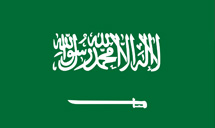 October 25, 2017
October 25, 2017Saudi Arabia added “Adil Abduh Fari Uthman al-Dhubhani” to its list of designated terrorist individuals.Thomas Joscelyn, “US and Gulf nations sanction 8 jihadists in Yemen,” Long War Journal, October 25, 2017, https://www.longwarjournal.org/archives/2017/10/us-and-gulf-nations-sanction-8-jihadists-in-yemen.php.
Qatar
 October 25, 2017
October 25, 2017Qatar added “Adil Abduh Fari Uthman al-Dhubhani” to its list of designated terrorist individuals.Thomas Joscelyn, “US and Gulf nations sanction 8 jihadists in Yemen,” Long War Journal, October 25, 2017, https://www.longwarjournal.org/archives/2017/10/us-and-gulf-nations-sanction-8-jihadists-in-yemen.php.
United Arab Emirates
 October 25, 2017
October 25, 2017The United Arab Emirates added “Adil Abduh Fari Uthman al-Dhubhani” to its list of designated terrorist individuals.Thomas Joscelyn, “US and Gulf nations sanction 8 jihadists in Yemen,” Long War Journal, October 25, 2017, https://www.longwarjournal.org/archives/2017/10/us-and-gulf-nations-sanction-8-jihadists-in-yemen.php.

Radwan Muhammad Husayn Ali Qanan is a deputy field commander and senior leader of ISIS in Yemen. Prior, he was a leader of operations responsible for assassinations and plots to kidnap foreigners. According to the U.S. Department of the Treasury, he has been considered “one of the most dangerous members” of ISIS in Yemen since 2015.“Treasury and Terrorist Financing Targeting Certain Partners Issue First Joint Sanctions Against Key Terrorists and Supporters,” U.S. Department of the Treasury, October 25, 2017, https://www.treasury.gov/press-center/press-releases/Pages/sm0187.aspx. He was designated as a terrorist by the United States and six Gulf countries in October 2017.Thomas Joscelyn, “US and Gulf nations sanction 8 jihadists in Yemen,” Long War Journal, October 25, 2017, https://www.longwarjournal.org/archives/2017/10/us-and-gulf-nations-sanction-8-jihadists-in-yemen.php.
Qanan, who holds Yemeni citizenship, was either born in 1975 or 1982.“Counter Terrorism Designations,” U.S. Department of the Treasury, October 25, 2017, https://www.treasury.gov/resource-center/sanctions/OFAC-Enforcement/Pages/20171025.aspx; “Saudi Arabia adds 11 Qaeda, ISIS-linked Yemenis on terror list,” Al Arabiya English, October 25, 2017, https://english.alarabiya.net/en/News/gulf/2017/10/25/Saudi-State-Security-lists-two-entities-and-eleven-names-supporting-al-Qaeda-ISIS.html. He joined ISIS’s affiliate in Yemen sometime after the group was established in November 2014. He served as the military emir of ISIS in Yemen during the beginning of the Saudi-led military campaign in the country in March 2015. Also that year, Qanan led a campaign to target and kidnap foreigners and by October, was considered to be “one of the most dangerous members” of ISIS in Yemen, according to the U.S. Department of the Treasury. As of late 2015, he was one of the most senior officials of the group operating out of Aden, Yemen.“Treasury and Terrorist Financing Targeting Certain Partners Issue First Joint Sanctions Against Key Terrorists and Supporters,” U.S. Department of the Treasury, October 25, 2017, https://www.treasury.gov/press-center/press-releases/Pages/sm0187.aspx.
In early 2016, Qanan directed assassination operations for ISIS in Yemen. He also served as a commander and received funding from “multiple sources” in support of his leadership roles, according to the U.S. Department of the Treasury. By mid-2017, he was considered a key leader of ISIS in Aden Governorate. Additionally, he served as deputy field commander as well as a regional field commander for the group in southern Yemen.“Treasury and Terrorist Financing Targeting Certain Partners Issue First Joint Sanctions Against Key Terrorists and Supporters,” U.S. Department of the Treasury, October 25, 2017, https://www.treasury.gov/press-center/press-releases/Pages/sm0187.aspx.
On October 25, 2017, the U.S. Treasury Department named Qanan a Specially Designated Global Terrorist for acting for or on behalf of ISIS in Yemen.“Treasury and Terrorist Financing Targeting Certain Partners Issue First Joint Sanctions Against Key Terrorists and Supporters,” U.S. Department of the Treasury, October 25, 2017, https://www.treasury.gov/press-center/press-releases/Pages/sm0187.aspx. Several Gulf countries also belonging to the Terrorist Financing Targeting Center, a coalition of nations established in May 2017, also agreed to impose similar sanctions against Qanan on the same date. These countries included Saudi Arabia, Bahrain, Kuwait, Oman, Qatar, and the United Arab Emirates.Gregory D. Johnsen, “Al-Qa’ida and the Islamic State Benefit as Yemen War Drags On,” Combating Terrorism Center at West Point, January 19, 2016, https://ctc.usma.edu/posts/al-qaida-and-the-islamic-state-benefit-as-yemen-war-drags-on; “Treasury Sanctions Major Islamic State of Iraq and the Levant Leaders, Financial Figures, Facilitators, and Supporters,” U.S. Department of the Treasury, September 29, 2015, https://www.treasury.gov/press-center/press-releases/Pages/jl0188.aspx.
- Abu ‘Abd al-Rahman al-Adani“Counter Terrorism Designations,” U.S. Department of the Treasury, October 25, 2017, https://www.treasury.gov/resource-center/sanctions/OFAC-Enforcement/Pages/20171025.aspx.
- Basil Muhsin Ahmad al-Naqaz“Counter Terrorism Designations,” U.S. Department of the Treasury, October 25, 2017, https://www.treasury.gov/resource-center/sanctions/OFAC-Enforcement/Pages/20171025.aspx.
- Radwan Kanan“Counter Terrorism Designations,” U.S. Department of the Treasury, October 25, 2017, https://www.treasury.gov/resource-center/sanctions/OFAC-Enforcement/Pages/20171025.aspx.
- Radwan Kanna“Counter Terrorism Designations,” U.S. Department of the Treasury, October 25, 2017, https://www.treasury.gov/resource-center/sanctions/OFAC-Enforcement/Pages/20171025.aspx.
- Radwan Mohammad Hussein Qanan “Saudi Arabia adds 11 Qaeda, ISIS-linked Yemenis on terror list,” Al Arabiya English, October 25, 2017, https://english.alarabiya.net/en/News/gulf/2017/10/25/Saudi-State-Security-lists-two-entities-and-eleven-names-supporting-al-Qaeda-ISIS.html.
- Radwan Qanan “Saudi Arabia adds 11 Qaeda, ISIS-linked Yemenis on terror list,” Al Arabiya English, October 25, 2017, https://english.alarabiya.net/en/News/gulf/2017/10/25/Saudi-State-Security-lists-two-entities-and-eleven-names-supporting-al-Qaeda-ISIS.html.

Khalid al-Marfadi is a military leader for ISIS’s affiliate in Yemen. Prior, he was the leader of ISIS in the district of Yafa in Yemen’s Lahij Governorate, where he also worked to recruit and train ISIS militants. He has been involved in many of the group’s operations and has worked to plan, prepare, and direct ISIS attacks in Yemen.“Treasury and Terrorist Financing Targeting Certain Partners Issue First Joint Sanctions Against Key Terrorists and Supporters,” U.S. Department of the Treasury, October 25, 2017, https://www.treasury.gov/press-center/press-releases/Pages/sm0187.aspx. He was designated as a terrorist by the United States and six Gulf countries in October 2017.Thomas Joscelyn, “US and Gulf nations sanction 8 jihadists in Yemen,” Long War Journal, October 25, 2017, https://www.longwarjournal.org/archives/2017/10/us-and-gulf-nations-sanction-8-jihadists-in-yemen.php.
Marfadi was born in 1966 and holds Yemeni citizenship.“Saudi Arabia adds 11 Qaeda, ISIS-linked Yemenis on terror list,” Al Arabiya English, October 25, 2017, https://english.alarabiya.net/en/News/gulf/2017/10/25/Saudi-State-Security-lists-two-entities-and-eleven-names-supporting-al-Qaeda-ISIS.html; “Counter Terrorism Designations,” U.S. Department of the Treasury, October 25, 2017, https://www.treasury.gov/resource-center/sanctions/OFAC-Enforcement/Pages/20171025.aspx. He joined ISIS’s affiliate in Yemen sometime after the group was established in November 2014 and held various important positions. In 2015, he was an official for ISIS in Yemen’s Lahij Governorate, with about 50-60 militants reporting to him. By early 2016, Marfadi was senior enough to have advance knowledge of the majority of ISIS’s attacks in the country, and was even responsible for facilitating some of them.“Treasury and Terrorist Financing Targeting Certain Partners Issue First Joint Sanctions Against Key Terrorists and Supporters,” U.S. Department of the Treasury, October 25, 2017, https://www.treasury.gov/press-center/press-releases/Pages/sm0187.aspx. He also attempted to negotiate an agreement for joint operations between ISIS in Yemen and al-Qaeda in the Arabian Peninsula (AQAP) during this time.“Treasury and Terrorist Financing Targeting Certain Partners Issue First Joint Sanctions Against Key Terrorists and Supporters,” U.S. Department of the Treasury, October 25, 2017, https://www.treasury.gov/press-center/press-releases/Pages/sm0187.aspx; Gregory D. Johnsen, “Al-Qa’ida and the Islamic State Benefit as Yemen War Drags On,” Combating Terrorism Center at West Point, January 19, 2016, https://ctc.usma.edu/posts/al-qaida-and-the-islamic-state-benefit-as-yemen-war-drags-on.
By April 2016, Marfadi was the leader of ISIS in Yemen’s Yafa district in Lahij Governorate. He recruited fighters from the district and ran a training camp there. By mid-2016, he was reportedly responsible for preparing vehicle-borne improvised explosive devices in Yemen’s Lahij Governorate that were used for ISIS attacks in the country. He also became part of an assassination cell that targeted security forces in southern Yemen. By mid-2017, Marfadi was known to be a military commander who directed the movements of ISIS fighters and gave orders to the commander of operations of ISIS in Yemen.“Treasury and Terrorist Financing Targeting Certain Partners Issue First Joint Sanctions Against Key Terrorists and Supporters,” U.S. Department of the Treasury, October 25, 2017, https://www.treasury.gov/press-center/press-releases/Pages/sm0187.aspx.
On October 25, 2017, the U.S. Department of the Treasury named Marfadi a Specially Designated Global Terrorist for acting for or on behalf of ISIS in Yemen and for providing support or services to the group.“Treasury and Terrorist Financing Targeting Certain Partners Issue First Joint Sanctions Against Key Terrorists and Supporters,” U.S. Department of the Treasury, October 25, 2017, https://www.treasury.gov/press-center/press-releases/Pages/sm0187.aspx. Several Gulf countries also belonging to the Terrorist Financing Targeting Center, a coalition of nations established in May 2017, also agreed to impose similar sanctions against Marfadi on the same date. These countries included Saudi Arabia, Bahrain, Kuwait, Oman, Qatar, and the United Arab Emirates.Thomas Joscelyn, “US and Gulf nations sanction 8 jihadists in Yemen,” Long War Journal, October 25, 2017, https://www.longwarjournal.org/archives/2017/10/us-and-gulf-nations-sanction-8-jihadists-in-yemen.php.
- Abu Anas Al-Yafi’i“Counter Terrorism Designations,” U.S. Department of the Treasury, October 25, 2017, https://www.treasury.gov/resource-center/sanctions/OFAC-Enforcement/Pages/20171025.aspx.
- Khalid Abdallah Salah Ahmad Hussayn al-‘Umari al-Marfadi al-Yafi’i“Counter Terrorism Designations,” U.S. Department of the Treasury, October 25, 2017, https://www.treasury.gov/resource-center/sanctions/OFAC-Enforcement/Pages/20171025.aspx.
- Khalid Abdullah Saleh Al-Marfidi“Saudi Arabia adds 11 Qaeda, ISIS-linked Yemenis on terror list,” Al Arabiya English, October 25, 2017, https://english.alarabiya.net/en/News/gulf/2017/10/25/Saudi-State-Security-lists-two-entities-and-eleven-names-supporting-al-Qaeda-ISIS.html.
United States
 October 25, 2017
October 25, 2017The U.S. Department of the Treasury designated “Khalid al-Marfadi” as a Specially Designated Global Terrorist pursuant to Executive Order (E.O.) 13224.“Counter Terrorism Designations,” U.S. Department of the Treasury, October 25, 2017, https://www.treasury.gov/resource-center/sanctions/OFAC-Enforcement/Pages/20171025.aspx.
Bahrain
 October 25, 2017
October 25, 2017Bahrain added “Khalid al-Marfadi” to its list of designated terrorist individuals.Thomas Joscelyn, “US and Gulf nations sanction 8 jihadists in Yemen,” Long War Journal, October 25, 2017, https://www.longwarjournal.org/archives/2017/10/us-and-gulf-nations-sanction-8-jihadists-in-yemen.php.
Oman
 October 25, 2017
October 25, 2017Oman added “Khalid al-Marfadi” to its list of designated terrorist individuals.Thomas Joscelyn, “US and Gulf nations sanction 8 jihadists in Yemen,” Long War Journal, October 25, 2017, https://www.longwarjournal.org/archives/2017/10/us-and-gulf-nations-sanction-8-jihadists-in-yemen.php.
Saudi Arabia
 October 25, 2017
October 25, 2017Saudi Arabia added “Khalid al-Marfadi” to its list of designated terrorist individuals.Thomas Joscelyn, “US and Gulf nations sanction 8 jihadists in Yemen,” Long War Journal, October 25, 2017, https://www.longwarjournal.org/archives/2017/10/us-and-gulf-nations-sanction-8-jihadists-in-yemen.php.
Qatar
 October 25, 2017
October 25, 2017Qatar added “Khalid al-Marfadi” to its list of designated terrorist individuals.Thomas Joscelyn, “US and Gulf nations sanction 8 jihadists in Yemen,” Long War Journal, October 25, 2017, https://www.longwarjournal.org/archives/2017/10/us-and-gulf-nations-sanction-8-jihadists-in-yemen.php.
United Arab Emirates
 October 25, 2017
October 25, 2017United Arab Emirates added “Khalid al-Marfadi” to its list of designated terrorist individuals.Thomas Joscelyn, “US and Gulf nations sanction 8 jihadists in Yemen,” Long War Journal, October 25, 2017, https://www.longwarjournal.org/archives/2017/10/us-and-gulf-nations-sanction-8-jihadists-in-yemen.php.

Stay up to date on our latest news.
Get the latest news on extremism and counter-extremism delivered to your inbox.